





























Dear Members and Wider Business Community,
Welcome to our Autumn/Winter edition of our Limerick Chamber Connect Magazine. We were delighted this year to reintroduce this member publication to our community following a sabbatical of over eight years.

Over the course of the following pages, our editorial team and sponsors have worked to bring you topics and guidance to help your business grow while also addressing upcoming trends impacting the wider business environment.
Our vision would be that Chamber Connect would offer an opportunity for our business community to embrace the opportunities within the network, increase the awareness of their business and contributions to the region, and ultimately harnessing the knowledge and guidance available within the network.
Limerick Chamber is keen to listen, understand, engage, and embrace the challenges faced by our members. Our goal is to play a pivotal role in assisting with supports from networking
opportunities, educational and profiling for businesses in the area, as well as orchestrating peer to peer connections. Limerick Chamber invites you to partake and share your concerns, suggestions, thoughts, and feedback through our regular surveys or by reaching out and speaking with any member of the Chamber team. If there is something we at Limerick Chamber can help support you with, please do not hesitate to contact us, we are here to help.
We have had an incredibly busy year here at Limerick Chamber. We thank our team, board, and President Donal Cantillon for the unrelenting support we have received throughout this past year. As we look ahead to 2023, we have a number of initiatives and supports we are excited to share and offer to you, our community. Stay Tuned!
Best Wishes Dee RyanDee Ryan Chief Executive Officer












Dermot
Aisling















 Our Board is annually elected from within our membership each February. The Board sets the priority focus for the Chamber, reflecting the views of our diverse Mid West business community.
Donal Cantillon President Partner Focus Capital Partners
Miriam O’Connor Vice President Partner Sellors
Donnacha Hurley Past President General Manager Absolute Hotel
Noel Gavin Senior Vice President, Northern Trust
Pat Keating Chief Executive Office, Shannon Foynes Port Company
Leanne Storan Director, EY
Paul Ryan Senior Director Support & Site Lead, WP Engine
Maria Gleeson Chief Operating Officer, The Pudding
Mairead Connolly Partner, PWC
James Ryan Owner Centra William St. & O’ Connell St. Limerick
Lavinia Ryan Initiative Lead, New Ways of Working People & Sustainability, Vhi Group
Graham Burns Director CPL Regional Offices, CPL Resources
Mick Ryan Head of Business Banking Mid-West, Bank Of Ireland
Dr. Liam Brown Vice President Research, Development & Innovation, TUS
Muriel Kelly HR Director Edwards lifescience
Alan Higgins Director of Operations & Digital Solutions, Ingenium
Our Board is annually elected from within our membership each February. The Board sets the priority focus for the Chamber, reflecting the views of our diverse Mid West business community.
Donal Cantillon President Partner Focus Capital Partners
Miriam O’Connor Vice President Partner Sellors
Donnacha Hurley Past President General Manager Absolute Hotel
Noel Gavin Senior Vice President, Northern Trust
Pat Keating Chief Executive Office, Shannon Foynes Port Company
Leanne Storan Director, EY
Paul Ryan Senior Director Support & Site Lead, WP Engine
Maria Gleeson Chief Operating Officer, The Pudding
Mairead Connolly Partner, PWC
James Ryan Owner Centra William St. & O’ Connell St. Limerick
Lavinia Ryan Initiative Lead, New Ways of Working People & Sustainability, Vhi Group
Graham Burns Director CPL Regional Offices, CPL Resources
Mick Ryan Head of Business Banking Mid-West, Bank Of Ireland
Dr. Liam Brown Vice President Research, Development & Innovation, TUS
Muriel Kelly HR Director Edwards lifescience
Alan Higgins Director of Operations & Digital Solutions, Ingenium







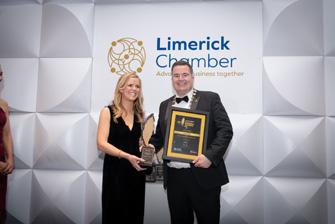
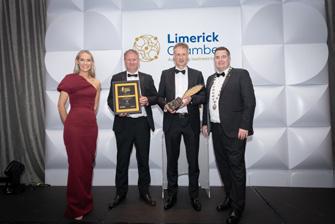




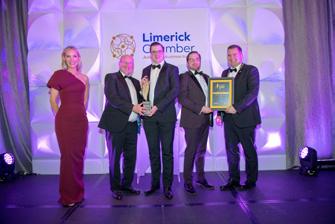
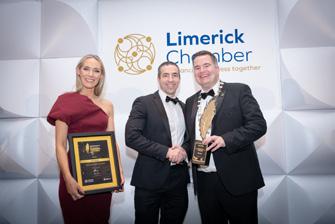
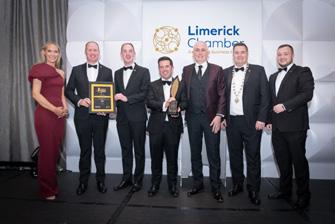
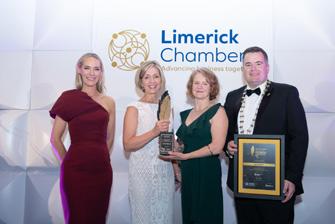

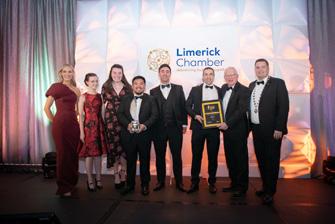
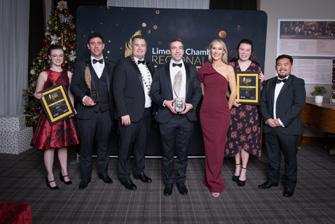


For further information on any of our training visit limerickchamber.ie/train or get in touch:



Michael Mac Curtain, Skillnet Manager


E: m.maccurtain@limerickchamber.ie
Sian Murray, Skillnet Administrator E: s.murray@limerickchamber.ie



Limerick Chamber represents the voice of business in the Mid-West by working with our members to establish the key policy issues, develop credible arguments and provide leadership to successfully influence senior policy makers at local, regional and national levels. We proactively develop policy and we effectively lobby to deliver decisions that support the economic and social development of the city and region. We support business and investment growth within the city and region, working with relevant stakeholders where appropriate. Limerick Chamber strives to be the “first port of call” and the leading source of knowledge and expertise in establishing business and investing in the city and region.
• Pre-Budget Submission 2023
• Mid-West Economic Insights
• Limerick Chamber UL Annacotty Greenway Submission
• Limerick Chamber Submission to TUS Moylish to City Active Travel Scheme
To view all our publications visit limerickchamber.ie/publications or get in touch with our Limerick Chamber Policy Team: Seán Golden, Chief Economist / Director of Policy ENVELOPE sgolden@limerickchamber.ie
Diarmuid O’Shea, Economist / Policy Analyst ENVELOPE doshea@limerickchamber.ie



A proven track record in being a strong and active representative voice and influencer on regional and national policy issues.
Strong collaboration with stakeholders for mutually beneficial end goals. Our Retail, SME and Corporate Partners strands.
A designated Chamber Economist. Collaboration with external parties on research projects, where appropriate.
 Seán Golden Chief Economist / Director of Policy
Diarmuid O’Shea Economist / Policy Analyst
Seán Golden Chief Economist / Director of Policy
Diarmuid O’Shea Economist / Policy Analyst
More than €6 Billion being invested in 39 capital projects across Limerick, Clare and Tipperary, ranging from commercial developments, infrastructure, healthcare, housing, schools and public realm.
10th Nov 2022
A new online portal providing detailed information on estimated combined €6 Billion worth of investments in 39 major projects across the Mid-West was launched today by Limerick Chamber. The ‘Strategic Development Pipeline’ (SDP) outlines large scale projects that are committed to or underway across the region.
The open database of development information curated by Limerick Chamber, is free to access and sits on the Limerick Chamber website. Information on each project is broken down in to phases from preliminary design, planning application, ground and enabling works all the way through construction to completion.

The Strategic Development Pipeline (SDP) shows what stage each project currently is at, what phases have been complete and what phases are yet to come. Covering both public and private developments, the SDP provides a holistic picture of significant capital projects across the Mid-West region.
The online database was completed with significant collaboration and buy in from project owners, the organisations who are responsible for a combined estimated investment of €6 Billion in the Mid-West and is a first of its kind for Ireland.
“The genesis of the strategic development pipeline came from a finding in the ‘Future Development of Limerick City’ report which was commissioned by Limerick Chamber in 2021. The commissioning of the report was driven by a sense of urgency that the business community, through Limerick Chamber, should take responsibility and play a lead role in protecting and enhancing the future of Limerick city. The report recommended that a public dashboard be commissioned for displaying and tracking of key capital projects to provide increased transparency and timelines around commenced and announced developments.
Given that Limerick Chamber is the largest business representative body in the Mid-West, we felt it appropriate to expand the remit from Limerick city to the whole region showcasing public and private development investments. The purpose of the strategic development pipeline is to act as a point of contact for citizens and stakeholders to showcase what projects are underway, it will also help to ensure greater accountability around delivery of public projects across the
Donal Cantillon, President of Limerick Chamber and Director with Focus Capital, said:‘We aim to provide a holistic overview of the direction of travel for the region, and crucially to pinpoint where we are on that journey.’
region by organisations who hold the key to unlocking the tremendous potential in Limerick city and beyond via the numerous projects they are charged with delivering”.
Dee Ryan, CEO of Limerick Chamber said:
“The progress of key strategic projects across the region is of critical interest to businesses, investors and individuals – in fact it is one of the most frequent topics that I get asked about.
Members have an expectation that these significant investments in our area will bring positive benefits to their businesses. Limerick Chamber decided to allocate significant resources in delivering this database. We aim to provide a holistic overview of the direction of travel for the region, and crucially to pinpoint where we are on that journey.
You will be able to browse information on the good work that is taking place across public and private sector and to check back throughout the year for up-dates on progress.
Limerick Chamber wants the Development Pipeline to give confidence to investors and individuals in choosing the MidWest as home for their businesses and families.

Seán Golden, Chief Economist and Director with Policy said:
“It isn’t easy getting a project of this scope and size off the ground. But there was significant collaboration across the public and private sectors to bring this project to fruition. It was driven, by all parties, by a sense of urgency to outline all the great work underway in the Mid-West. This project is a first of its kind for Ireland and is something that works well in Antwerp, Arhaus and Bristol – now the Mid-West. The project will help to identify priority projects for the Mid-West, especially through the lens of Project Ireland 2040 and the additional population targets allocated for the Mid-West and it will also help to identify any potential infrastructure gaps that we need to support this population increase. Ultimately it will help us to identify projects and their timelines and increase accountability around delivery of public projects while also including the vast privately driven investment underway across the region”

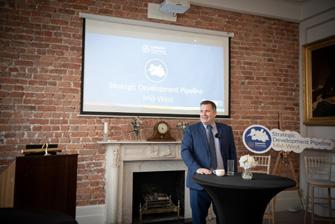
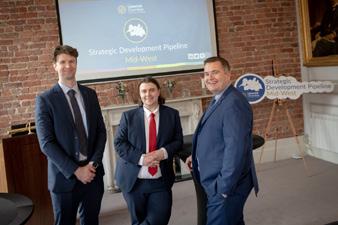
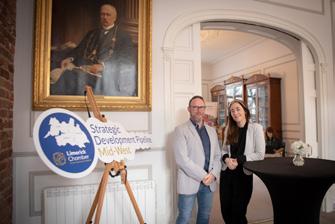
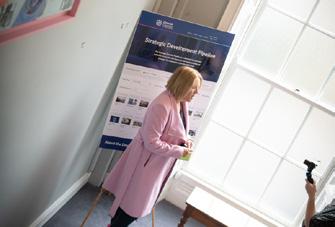


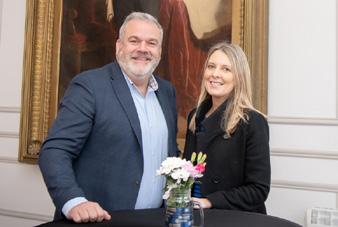
Why not visit Limerick Museum, one of the oldest museums in the country, which tells the story of Limerick City and County through its vast collection of 63,000 objects from Stone Age axes to medieval coins, from the civic sword of Queen Elizabeth I to 1916 Rising medals.
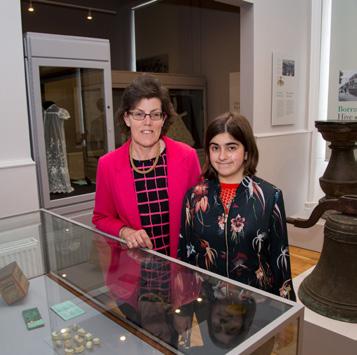
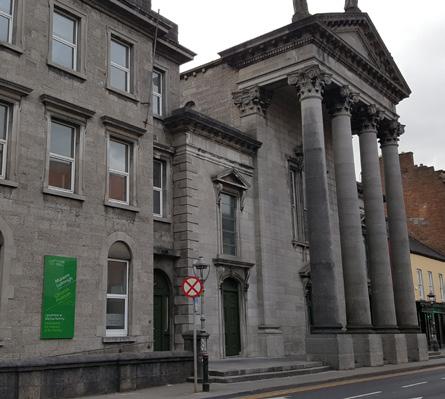
Among the wealth of wonderful items on display are the 450year old mummified Ireton’s Cat; a 3 billion-year old fragment from the largest meteorite shower that ever fell in Ireland; gorgeous Limerick lace and Limerick silver from the Golden Age of Limerick craft industry; and two World War II gasmasks that fortunately never had to be used.
Location: Old Franciscan Friary, Henry Street, Limerick City, V94 C7W1.
Opening hours: Monday to Friday 10.00-5.00.
Admission: Free
Gender Pay Gap reporting is coming. Leanne Storan, Tax Partner in EY Limerick and Deirdre Malone, Head of Employment Law with EY Law Ireland, explain what it means for organisations and its likely impact.

Organisations in the Mid-West and across Ireland will shortly begin reporting on their Gender Pay Gap under the new legislation, which formally came into force on 31 May last. The landmark piece of legislation is aimed at bringing about pay transparency in organisations and helping to achieve gender equality in the workplace.
Under the regulations, organisations with more than 250 employees are required to report on their Gender Pay Gap by December. The report is based on the 12-month period leading up to a ‘snapshot’ date in June 2022 chosen by employers, and must be published on the organisation’s website or in some other way that is accessible to the general public and its employees.
The legislation will apply to organisations with more than 150 employees from 2024 and those with more than 50 employees will be required to report from 2025. It is therefore very important for businesses of all sizes to start preparing now to report on their gender pay gaps and work on developing initiatives to reduce the gap.
The range of metrics to be reported on is of key importance. The legislation is not about equal pay; this has been a legal requirement for almost five decades. It is about revealing the average earnings of people across the whole organisation to understand overall gender representation. Significantly higher average pay for one gender will point to a potential bias against the other.
Organisations are required to report on mean (average) and median (mid-point between highest and lowest) hourly pay for its male and female employees. They are also required to report on mean and median hourly pay gaps for part-time, temporary/fixed term employees, bonus pay, benefits-in-kind
and the proportion of males and females in the lower, lower middle, upper middle and upper quartile pay bands.
It is important to note that the range of employees covered under the legislation is very broad. It includes full-time, parttime and temporary employees, employees on sick leave, maternity leave, those on secondment (including overseas), as well as workers posted overseas. This high level of detail is intended to produce a comprehensive and transparent picture of gender representation in the workplace across Ireland.
The report must include a statement explaining the employer’s opinion as to why there is a gap, if there is one. In addition, it must set out details of the measures the employer is taking or intends taking to bridge the gap.
While Ireland compares well in comparison with the European average in terms of its estimated gender pay gap – 11.3% versus 12.5% according to the latest OECD Eurostat report – GPG reporting will shine a spotlight on organisations where there are marked pay inequalities. This in itself should drive improvements, but it is also probable that the identification of inequality in one area will lead to wider change within organisations, particularly in relation to culture.
Increased awareness of inequities within an organisation will likely lead to a greater focus on the overall diversity, equality, and inclusion agenda and encourage moves towards a broader and more diverse workforce composition.
It is also probable that an organisation’s gender pay gap score will play an increasingly important role in its ability to attract and retain talent. It will become a proxy for the organisation’s commitment to fairness and equality of opportunity with employees and potential job candidates taking it into account when making career decisions.
In the final analysis, a good gender pay gap score will tend to be a reflection of a healthy corporate culture. Furthermore, gender pay gap reporting is likely to drive positive change in those organisations with a poor score.
Who should be included in the GPG report?
All employees must be included, technically also including individual contractors who are engaged personally to provide services.
Does an employer have to report contractors even where the contractor is responsible for their own pay and hours worked?
This is problematic. Employers will not have HR records for contractors and are unlikely to know how the contractor identifies their gender, nor will they have visibility on how a contractor determines pay or bonus. Organisations may need to take a practical view of the definition of “employee” under the legislation and may find that they have no choice but to potentially exclude this data. This will need to be addressed in the report.
Ordinary pay includes salary, allowances, overtime pay, pay for piecework, shift premium pay, sick leave pay, pay for garden leave, and any pay top-ups for statutory leave such as maternity or parental leave.
Are there any special arrangements for the treatment of sick leave and maternity leave which can potential skew hourly pay figures?
There are no special arrangements for the treatment of sick leave and maternity leave, and this may lead to certain anomalies arising in an organisation’s Gender Pay Gap report. Where sick leave and maternity leave is paid on the basis of a top-up on the social welfare benefit, only the portion paid by the employer is included in the calculation thereby artificially depressing the hourly pay rate of the employee in question. It may be advisable for employers to add explanatory notes where these anomalies arise.
Bonus pay used in the GPG calculation must include all bonus payments in the form of money, vouchers, shares, and share options and potential interests in shares. As share options are not reported through payroll this means that employers may have a number of sources of data to analyse in addition to standard payroll information.
What benefits in kind should be included?
Benefits in kind include any non-cash benefit of monetary value provided to an employee. Examples include the provision of a company car, voluntary health insurance, stock options, or share purchase schemes.
How should a company with numerous legal entities and subsidiaries located in Ireland report?
Many large organisations will wish to produce a single Gender Pay Gap report for their Irish operations. However, the legislation requires that all legal entities in the group which employ more than 250 people must meet their own statutory reporting obligation. There is nothing to prevent the organisation from producing a consolidated report as long as each of the legal entities also reports.



Does that mean an organisation with more than 250 employees doesn’t have to report on a separate entity in its group if it has fewer than 250 employees?
Yes. However, it is EY’s experience with clients in this situation that they want to report on such entities in any event – either within a consolidated report for the overall group or separately. They are motivated by a desire to be as transparent as possible in their reporting.
What happens if an employee or employees define themselves as neither male nor female or has transitioned from one gender to another?
There is no definition of male or female within the legislation. It is entirely up to the employee to define their own gender. Employees should be included in the report according to their chosen gender. Employees who self-define as of neither gender should be excluded from the calculations but should be included for the purpose of headcount.
Leanne Storan, Tax Partner in EY Limerick
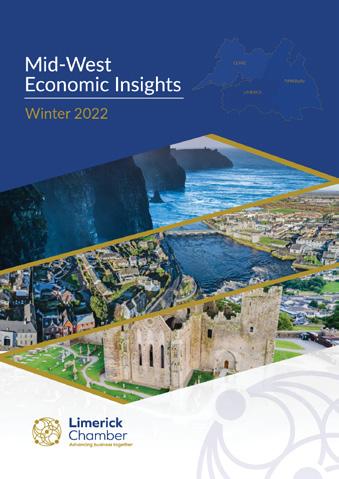
Over the course of its 217 years, the Limerick Chamber has been witness to and an active participant in history in the making. And that continues to be the case. As we look forward to the coming centuries, it’s important to take stock of where we’ve come from, alongside a view toward the future. Our most recent bicentennial Chamber President Catherine Duffy and our current 2022 Limerick Chamber President Donal Cantillon both have insights to offer as we look back to look ahead.
When Catherine Duffy relocated to Limerick to take up a position as General Manager of Northern Trust, one of the first things she did was join the Limerick Chamber. She was quickly accepted onto the board, “There were 20 of us on the board, and immediately I had 19 friends, 19 helpers, 19 people I could collaborate with, 19 people I could pick up the phone to ask them for help. And they did help me.”
That can-do spirit of collaboration both helped Catherine acclimatise to a new city and inspired her to continue her work with the Limerick Chamber, taking on the position as its president in 2015. During her tenure, the board sought to bolster its ranks to ensure it was able to help the region as much as possible, “We worked on the board to make sure we had the right people on it,” Catherine explained.
Throughout this time, the board also created forums that would allow leadership to better understand the needs of business owners in Limerick as well as the greater Limerick area. ”We knew we needed to hold the correct forums as well as make sure we had the correct experts at them who either had an interest in those issues or who would be able to solve those issues.”
Job creation was a particularly important issue at the time, as was improving the retail experience in Limerick city, including working for the purple flag, which indicates that retail, arts and culture locations, pubs, restaurants, and more, could open late to serve more customers. “This involved getting the retailers on board,” Catherine explained, and began to set the groundwork for the 2030 strategic plan. “We really had to ask, what kind of city do we want?”
Of course, during this time period, the Limerick Chamber also looked outward toward job creation and infrastructure expansion in the greater Shannon area, including ongoing
discussions about the motorway, which is still being discussed to this day. “I do see the area evolving. I know it’s taking time,” Catherine said, “but there’s a great master plan there.”
Catherine has continued to work with the Limerick Chamber on strategic partnerships even after handing over the reins, “They helped me at the very beginning, so I’m always here to help them.”

As we look forward, current 2022 Limerick Chamber President Donal Cantillon explained that the organisation has continued to build on the work of earlier generations. “While there are other business groups, the Chamber has over 200 years speaking for local business on matters affecting Limerick and the region,” he said, “This may make the organisation old, but it remains dynamic and needed as a voice for those who don’t have one.”
Even throughout the COVID-19 period, the Limerick Chamber has been pushing full speed ahead to ensure that it reflects the needs and desires of its members and the citizens of the Midwest region. There have been many big gains made during that time, including a few particularly gratifying highlights, including work on the Foynes to Limerick road which recently received planning permission, the near completion of the O’Connell Street renovation works, and the live launch of the Strategic Development Pipeline.
“The Chamber is proud of its role in lobbying government to back the Foynes to Limerick Road, including the Adare bypass,” Donal said. The project received An Bord Pleanola’s approval in late August, which was a major step in the right direction. Donal explained, “While project progress may be impacted by Judicial Review, it is progressing and we continue to maintain a strong watching brief to ensure its implementation, with phase one hopefully completed in time for the Ryder Cup in 2027.”
In addition to that successful milestone, the Chamber is looking forward to the completion of the O’Connell Street works over the coming months. Donal reported, “The O’Connell Street completion will positively impact the public realm and how local citizens interact with the city.”
The strategic development pipeline, which went live recently, was a direct result of the research the Chamber undertook
to provide a point of contact for citizens and stakeholders regarding upcoming public projects in the region. “It will also help to ensure greater accountability around delivery of those public projects across the region,” Donal explained. Many of those projects are the responsibility of Limerick City and County Council, and this Public Dashboard will help ensure greater accountability around unlocking Limerick city’s tremendous potential.
And as we look forward, one of the top priorities for the Chamber is to continue to be active in seeking to provide solutions to the climate crisis facing the country, Europe, and the wider world. “I am delighted to say that Limerick Chamber has been very active in this space and have made various submissions and recommendations to the Government regarding our energy security,” Donal said. In addition to these submissions, the Chamber has a seat on the Shannon Estuary Economic Task Force looking at the offshore wind opportunity off the west coast, and has maintained support for the Shannon Foynes Port’s “Vision 2041” as well as for the new Fortress Energy Shannon LNG project.
In an effort to make even further strides in the energy sector, the Limerick Chamber will be hosting an Energy Conference in January that will aim to bring together the key stakeholders who can make these ideas a reality for our region. Donal explained, “Our goal is to go from being an energy importer to being “The Battery of Europe” — an energy exporter,” he said, “And we’ll get to reap all the benefits that come with that status – greater energy security, price stability, employment and regional development.”
As the Limerick Chamber looks toward the start of 2023, future Presidents will have a strong foundation to continue to build for the people and businesses of Limerick.




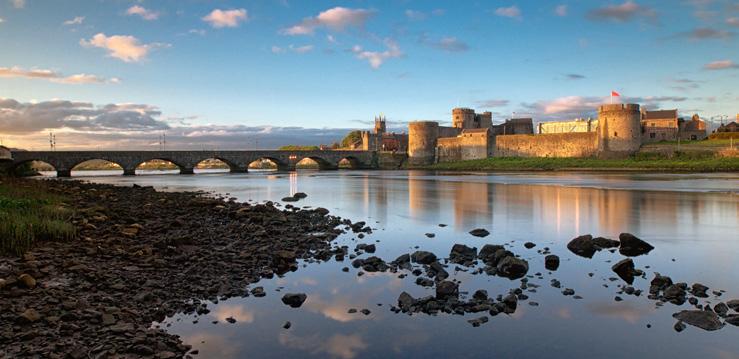

On a cold October day in 1840, a large crowd gathered at the Corn Exchange, in what is now Limerick’s Milk Market. Among them were stonecutters, cabinet-makers, weavers, and fishermen of St. Francis Abbey. The tradesmen were gathered to present a subscription to Daniel O’Connell on behalf of the guilds of Limerick.

‘The Liberator’ was, according to the Freeman’s Journal, “in a Repealer’s coat of grey frize (sic) with velvet collar and yellow buttons…a truly noble specimen of a genuine Irishman [in] the simple and homely garb of the people.” Those people were all members of craft guilds, part of a long tradition of commercial organisations that began with the Limerick Guild Merchant of 1197 — the forerunner of the modern Chamber of Commerce.
In their book “Limerick’s Merchants, Traders & Shakers –Celebrating two centuries of enterprise”, Matthew Potter and Sharon Slater write that the Guild Merchant of the 12th century was “very similar to the modern Chamber of Commerce in that it sought to promote the economic development of the city, and worked to uphold the interests of the community”
The history of our current Limerick Chamber begins in the early 1800s, when Limerick was under the control of a Corporation. Initially formed as part of the royal charter of 1197, the Corporation was effectively a form of local government, responsible for collecting taxes, maintaining law and order, electing representatives, and overseeing the day-to-day operations of the city. It was traditionally led by prominent members of local society, from a variety of religious backgrounds.
During the era of Ascendancy rule between 1691 and 1778, the Penal Laws came into effect, effectively removing Catholics from all positions of authority and influence, including those within Limerick Corporation. “The Protestant Ascendancy created a disconnection between the Protestant dominated Corporation on the one hand and the Catholic majority on the other. It also broke the traditional strong links binding the City Fathers to the commercial and manufacturing élite, many of whom continued to be Catholic,” write Matthew Potter and Sharon Slater.
As “the commercial centre of North Munster”, Limerick had prospered during the Georgian economic boom, and its business community had swelled as a result. Many of them moved into the new neighbourhood of Newtown Pery, where they forged social and professional connections. Historian
Jennifer Moore writes that “the corruption (of the Corporation) bred a new city and a new way of thinking.”
Frustrated (and in many cases, excluded) by what became an unrepresentative, ineffectual, and deeply corrupt Corporation, a number of these merchants began to meet informally in a coffee shop on Bridge Street (then Quay Lane) to discuss local business activities and concerns. “The local government system no longer reflected the wishes of the commercial classes and Limerick ceased to be governed as a business friendly city. Ultimately, this rupture led to the establishment of a Chamber of Commerce in Limerick,” notes Matthew Potter.
In 1805, this group of merchants formed the Commercial Building Company, with one hundred members each contributing £65 to construct the Commercial Buildings at Rutland Street (now part of the proposed Opera Square development). The elegant seven-bay building was said by contemporary observers to be “a very ornamental and commodious building”, containing “one of the most spacious and elegant coffee-rooms in Ireland.” Its total build cost reached £8,000 (which Matthew Potter and Sharon Slater estimate to be the equivalent of some €2.5m today).
Within a short time, this group became known as the Limerick Chamber of Commerce and commenced an astonishingly busy schedule of improvements in the city. From 1807 until 1852, it was described as being the most active chamber in the world.
The Chamber began with taking over the duties that had been largely abandoned by the Corporation at the time. “Not only was the Corporation a sectarian body, it had also given up most of its activities; it no longer regulated trade and commerce, oversaw market operations, or even ensured the streets were clean,” says Matthew Potter. “This is where the Chamber stepped into the breach, and began to perform a series of functions that really belonged to a local authority.” This included the collection of tolls, the regulation of the butter trade, the management of the harbour, and the building of Sarsfield Bridge (then Wellesley Bridge) to facilitate trade between Limerick City and Clare and beyond. They also contributed funds to promote agricultural improvements, protect salmon fisheries, and repair the city’s market.
To protect its members, the Chamber realised it needed to apply for separate legal status. It was subsequently granted a Royal Charter of King George III in 1815, making it one of the five oldest chambers of commerce in Ireland and the UK. It’s
noted in the book “Limerick’s Merchants, Traders & Shakers –Celebrating two centuries of enterprise” that very few chambers were granted Royal charters — indeed, Waterford’s Chamber was the only other recipient at that time.
In 1833 the Chamber moved to its present home, at 96 O’Connell Street (then George’s Street). The boom times had effectively ended with the Act of Union in 1800, and Ireland entered a period of depression which wouldn’t lift until the last days of the Great Famine in 1850. In the meeting at the Corn Exchange in 1840, a representative of Limerick’s Guilds said that “previous to the accursed union there were 1500 journeymen weavers at full work in this city. Now there are but 70, and these not half employed. We hear the old tanner tell that he recollects to see eighteen tan-yards at full work in the parish of St. Mary alone; now there is but one. The shoemaker tells the young men (a historical truth) that Limerick exported treble more boots and shoes previous to the Union than are made there by the journeymen of the present day, while the importation of British manufacture has driven their and all other trades to ruin, misery and despair.”
While Limerick did see the Industrial Revolution transform its fortunes like Belfast, Glasgow, or Birmingham, it did have a strong manufacturing tradition, which led to the emergence of a number of factories focused on food, clothing, footwear, and tobacco. The Chamber of Commerce welcomed investment from large-scale companies such as these, who provided much-needed employment for the city. Its efforts to improve the port also helped to maintain Limerick’s position as a key strategic base for many years.
On a day-to-day basis, it supported its members with commercially-useful information and statistics via magazines, newspapers, and industry publications which were invaluable in a pre-internet age. It also lobbied politicians, submitted petitions to Parliament, and represented the city’s interests in the expansion of the railway, the development of local infrastructure, and the improvement of the postal service. It played a major role in establishing the Limerick Market Trustees, which took over its oversight of this hub of commercial activity. The Chamber appealed to its members in four ways that Matthew Potter and Sharon Slater list as: purposive or expressive benefits (supporting shared causes); solidarity benefits (fostering a sense of belonging); material selective benefits (access to its library and resources); and insurance benefits (protecting against unforeseen circumstances).
In 1840, as part of efforts to reform the city’s leadership, the old, corrupt Corporation was abolished, and replaced by a new Corporation spearheaded by a City Council. The Chamber supported these reforms because they would reintegrate the city’s mercantile élite into the political process — although most of the population without property would remain excluded.
By 1852 the Chamber had given up a lot of their hands-on commitments such as toll collection and harbour oversight, as these gradually came back under the remit of the city’s (new) Corporation. This spelled the end of the Chamber’s most
industrious period, and it became more of a typical chamber of commerce, acting as a voluntary association. It did continue to play a key part in the city’s unfolding history, however, including the First World War in 1914, the Limerick Soviet of 1919, and the War of Independence, Civil War, and the foundation of the Irish State in the 1920s.
The economic stagnation that followed was reflected in the Limerick Chamber of Commerce, which was poorly funded and largely inactive for decades. The renovation of its headquarters in 1944, the revision of its by-laws in 1945, and the establishment of Limerick Junior Chamber in 1961 were the first sparks that would lead to its phoenix-like revival.
In the 1980s, the Chamber underwent what Matthew Potter and Sharon Slater call a “metamorphosis”, in which it began to reemerge “as a significant player in the economic life of both Limerick and the Mid-West region.” It expanded its catchment area, forged links with EU partners, and embarked on exciting initiatives abroad. A decade later, it turned its attention to two major priorities: Limerick Market and Shannon Airport. The former was restored to great success, reviving the location as a hub of local commercial activity. The latter’s gateway status was salvaged, and its importance as a major aviation hub protected.
By this time, the Chamber’s representatives included women, as Beatrice Keville and Deirdre Halpin — the first official female members — were welcomed in 1981. Over the following years, Chamber members met with prominent visitors including President Mary Robinson, Taoiseach Albert Reynolds, and US President Bill Clinton.
The Millennium ushered in a period of prosperity in Ireland which became known as the Celtic Tiger. The Limerick Chamber of Commerce was at the forefront of many of the city’s most exciting initiatives, from city centre redevelopment to the advancement of its educational bodies. It also changed its name in 2005 to ‘Limerick Chamber’, in keeping with efforts to unify the movement across Ireland.
It shepherded its membership and community through the dark days of 2008 and 2009, when Limerick suffered the loss of many jobs. Although its membership dropped by 20%, it continued to represent the city’s interests on regional and national stages, pressing for increased investment and resources for the struggling city. This resulted in what is now known as ‘Limerick 2030’, a history-making plan for the economic and social development of the region.
Although the global pandemic paused many of the Chamber’s most ambitious goals, the team pivoted quickly, providing much-needed support to a business community that was largely shuttered for extensive periods of time. Now, as we emerge from that period, the city is facing new challenges on a local and geo-political scale. However, through its 215-yearold history, the Limerick Chamber has proven itself able and willing to not just survive, but thrive.


Limerick has long been an attractive, strategic location to commercial-minded visitors, beginning with the overnight arrival of a fleet of Vikings in 922 AD. Led by a Danish nobleman, they formed a clay and wattle settlement on InisSibtonn, now known as King’s Island.
There they quickly established commercial roots, including a tithing system in which the native Irish people were forced to pay leaders taxes, redeemable in the form of produce, slaves or gold. One Viking leader is said to have demanded an ounce of gold for every nose; those unable to pay would have to sacrifice the appendage. He found his cruel and powerful advance halted, though, by the O’Briens of Clare, whose most famous son was Brian Boru.
Over time, these Vikings and Irish clans of Munster merged and established a thriving market environment, with links all over Ireland and beyond. Sharon Slater and Matthew Potter’s book “Limerick’s Merchants, Traders & Shakers – Celebrating two centuries of enterprise” credits Limerick’s Vikings with introducing to the city “urbanisation, coinage, a separate mercantile class, and a business friendly administrative system.”
When the Normans arrived in 1169, they brought about “an economic revolution resulting in the thirteenth century becoming one of the most prosperous periods in Ireland’s entire history.” They attracted an “influx of colonists from England, Wales, France, and Flanders; introduced modern agricultural and commercial techniques; and brought about major improvements in infrastructure.” They also embarked on a relentless period of construction, establishing some 330 towns and villages, mostly in Munster and Leinster. This was in part to form local government strongholds to be managed by sheriffs, bailiffs and other royal officers who were loyal to the crown.
The Norman King John saw Ireland as an untapped source of funds and was determined to access its wealth. In the early 13th century he put down rebellious Anglo-Norman settlers and bestowed royal charters on significant settlements, including Limerick, which was of national importance. A contemporary writer described it as being “washed by the Shannon, without dispute, the chief of Irish rivers; it is incredible what a quantity of fish you find here. King John of England, pleased with the agreeableness of this city, caused a very fine castle and bridge to be built there.”
As a result of this charter, Limerick grew quickly, albeit in two different directions. The area we now know as King’s Island was referred to as ‘Englishtown’, encompassing almost 30 acres. It was populated by the Anglo-Norman settlers, their families, their staff and an abundance of religious orders. The land just south of the river became ‘Irishtown’, the home of the native Irish and assimilated Vikings, who were most likely craftspeople, working with metal, leather, and food.

These two towns, along with some 5,000 acres of rural land, were ruled by the Corporation, which was established under the charter to administer justice, regulate trade, and oversee the maintenance and development of the city’s infrastructure. Archaeologist Brian Hodkinson’s research of historical manuscripts of the time demonstrates the rich commercial connections being formed: in 1236 a group of Italian merchants - including Bellicoci, Boneshalti and Caranzonesued a bishop for sums owed. French wine flowed into the city to be enjoyed by the élite, although it was heavily levied, then as now. Other exotic imports included fine cloth and jewellery, as well as salt and spices.
The harbour (located beside our modern Potato Market) was a hub of international and national commerce, while the market (at the gates of Irishtown) became the focus of local trade. The annual fair was the highlight of the year, lasting first for eight days, and later for fifteen. All activities were regulated and tolled by the Corporation, who reaped considerable profits — not least from Lax Weir in Corbally, which was abundant with fish. Much of this was exported to European kingdoms, along with local hides, timber, and raw wool. Evidence of the economic success of this period can still be seen today in the expansion of St. Mary’s Cathedral. Nicholas Street and Mary Street became the main thoroughfares, chosen as the site of many merchants’ fine homes and later, in 1449, the Corporation’s first city hall, The Tholsel.
The charter also provided for the formation of the Guild Merchant, which, according to Sharon Slater and Matthew Potter was “very similar to the modern Chamber of Commerce in that it sought to promote the economic development of the city, and worked to uphold the interests of the business community.” The Black Death (1348 -51) is thought to have wiped out up to half of Limerick’s small population of 2-3,000 and the economic crisis that followed gave rise to craft guilds, which were more narrow in their remit, focusing on particular
crafts, skills, or trades. The first such guild in Limerick is believed to have been that of the Barbers and Surgeons in 1470. Craft guilds, the Guild Merchant, and the Corporation tended to work in relative cohesion to control wages, prices, qualifications, and quality in medieval cities like Limerick.
The effects of the plague rippled across Irish society, leading to increased instability, compounded by the gradual collapse of English rule. In 1413, Henry V granted Limerick a charter that allowed it to operate with virtual independence until the Tudor conquest that ended in 1603.
From there followed a century of sieges, taking place in 1642, 1651, 1690, and 1691. Sharon Slater and Matthew Potter write that “the Cromwellian conquest of Ireland in the 1650s resulted in the overthrow of Limerick’s traditional merchant élite after 450 years.” This effectively meant the supplanting of Catholic landowners by what became known as the Protestant Ascendancy, compounded by the draconian Penal Laws. “The Catholic merchants possessed expertise, stock, and trading contacts with the Continent developed over many generations. With their expulsions, Limerick’s economy was ruined.”
Excluded from almost all positions of influence, industrious Catholic families turned all their attention to commerce. Some, including the Arthurs and Roches, along with wellknown Quaker families like the Harveys became highly successful in their endeavours, leaving their architectural mark on the city. The wealthy Protestant aristocrat Edmond Pery (later 1st Viscount Pery of Newtown-Pery) spearheaded the development of South Prior’s Land in 1770, which would eventually include our modern O’Connell Street, where Limerick Chamber’s offices now stand. This coincided with a period of prosperity, during which many of the city’s most affluent families moved into Newtown Pery, rather than hunkering down in secure country mansions. This brought a new vibrancy to Limerick, which was transformed from a wartorn garrison town to a lively, modern city.
Despite the inadequate (and corrupt) leadership of the Corporation at this time, Limerick’s economy was expanding rapidly, benefiting hugely from its strategic port location in the heart of the Golden Vale during a period of frenetic international trade. Arthur Young, visiting from London in 1776 noted that the city had gone from boasting four carriages (belonging to three clergymen and a gentleman)
to 183 in some 30 years, indicating the influx of wealthy inhabitants. By the end of the century, there was even a windmill positioned in Newtown Pery, demonstrating selfsufficiency and cutting-edge technology. The Georgian boom of 1750-1815 saw Ireland’s economy grow by “a total of 400 per cent and in 1815 was five times bigger than it had been in 1730” according to Sharon Slater and Matthew Potter. “As a result, population grew rapidly, vast wealth was created and a huge building boom transformed both urban and rural areas. The country’s infrastructure was also revolutionised with the building of roads, bridges and canals.”
It’s no coincidence that it was in these busy years that the Limerick Chamber of Commerce was formed, beginning with a collection of like-minded merchants in 1807. They set about regularising, improving, and expanding the city’s business activities, to great success.

As always, the boom wasn’t to last, and the Act of Union in 1800 is generally regarded as the beginning of the end of this golden period. The power that had been previously devolved to local authorities was now wielded directly from London, to devastating social, political, and economic effect.
This became particularly acute as the Industrial Revolution transformed Britain into a production powerhouse, leaving southern Irish cities like Limerick far behind. That’s not to say there were no factories in the region, however. Far from it; bacon producers included Mattersons, Shaws, O'Maras and Dennys; flour millers encompassed the Russells, Bannatynes, Goodbodys and Ranks; dairy products were manufactured by Cleeves; and clothing factories such as Tait’s emerged.

“Limerick continued to be a great trading city, and its business community also comprised numerous merchants, retailers, and publicans, a sector which increased in both numbers and importance after 1871,” write Sharon Slater and Matthew Potter. Despite the devastating effects of the Great Famine of 1845-1852, “the industrial profile of Limerick remained comparatively unchanged for 150 years (1820s to 1970s), “during which two sectors predominated, food / drink / tobacco and clothing / footwear.”
Then as now, many of the biggest employers were sons not native to the city, such as the bacon-producers John Russell and Joseph Matterson, both of whom were English. Peter Tait (Limerick Clothing Factory) was Scottish, and Sir Thomas Cleeve (the Condensed Milk Company of Ireland) was Canadian.

The 20th century was a time of momentous change for Ireland as a whole, and Limerick played a major part in key events, including the War of Independence and the Civil War. In 1919, the city’s many workers staged a general strike, which became known as the Limerick Soviet. It lasted just two weeks — and cost some £42,000 in wages — but catapulted the city onto international news headlines as a result.
The ‘Emergency’, as World War II was known in Ireland, the Anglo-Irish Trade War, and the government’s protectionist policies had a profound effect on Limerick’s agricultural economy, with emigration rising steadily as a result. By the 1960s a new, more outward-looking era was dawning, and the country experienced strong growth, boosted by Ireland’s entry to the European Union in 1973.
However, these changes also saw the loss of many of Limerick’s traditional industries. As pointed out by Sharon Slater and Matthew Potter, “Limerick’s two tobacco factories, Spillane’s and
Clune’s ceased production in 1968 and 1981 respectively. The clothing industry virtually disappeared when Limerick Clothing shut down in 1974, after 124 years in production, followed by Danus in 1975. In 1983, Ranks ceased production, marking the end of Limerick’s proud milling tradition. The famed bacon industry disappeared with the closure of Matterson’s in 1986 and O’Mara’s in 1987.”
New international employers took their place, including the German-run Krupps Engineering, South African diamond company De Beers, American manufacturer Analog Devices. Later, Dell Computers, Aughinish Alumina, and Moneypoint also provided extensive jobs. All of this, however, coupled with Shannon Airport’s development, pushed the region’s commercial activity out of the city and into industrial estates.
The city became somewhat neglected until the Celtic Tiger arrived in the early years of the Millenium. This saw major development in the city’s infrastructure and architecture, including bridges, a tunnel, and the sky-scraping Riverpoint building. Emigration — long a feature of Irish society — was halted, and for the first time in the nation’s history, large-scale immigration occurred, as many fellow Europeans made their homes in Limerick and beyond. This unprecedented period of economic growth ended with a crash in 2008, which was keenly felt by Limerick workers, many of whom lost their jobs.
The years that followed were exceptionally difficult for the region, but they did give rise to the amalgamation of Limerick City and County Council and the establishment of a task force, special committee, and many discussions, the culmination of which is now known as the Limerick 2030 Plan, which was launched in 2013. Designed to be implemented over 20 years, the plan has seen significant success already towards its stated aim of guiding ‘the economic, social and physical renaissance of Limerick City Centre and the wider County/ Mid-West Region’. It is joined in this endeavour by Limerick Chamber, and the many stakeholders who work to make our city a better place.
Many of the sites currently being developed as part of this plan are former bastions of commerce in Limerick’s long history. When completed, the works will see Opera Square, Cleeve’s Riverside Gardens, and The Garden Centre all become vibrant commercial hubs once again — continuing the efforts of those who sailed here in longboats, sent merchant ships to exotic locations, dispatched pork, lace, and military uniforms all around the world, and manufactured electrical devices, diamond jewellery, and computer chips. All of whom have played a valuable role in making Limerick the dynamic, ambitious, and business-friendly city that it is.
I was very recently appointed Process Adviser under the newly introduced SCARP legislation to a Mechanical & Electrical Engineering company with turnover of c €8mln and staff compliment of 70. The company in question had experienced profitability and recoverability issues on a number of non core projects it entered into at the commencement of Covid 19. This resulted in the company’s finances being significantly depleted and the company was facing liquidation. Thankfully however the adverse outcomes on these non core projects was not recurring and we could see a viable future for the company if we could devise a credible rescue plan, attract investment and gain the support of the creditors of the company for a restructure.
I am happy to report we, working alongside the company, were able to attract the necessary investment and secured the overwhelming support of the creditors (greater than 90%) for the Rescue Plan we laid before them. The company successfully exited the SCARP process last month with a rightsized, restructured balance sheet along with new additions to the board and the creditors secured an initial dividend which was greater than that recoverable in a liquidation scenario along with the potential for further dividends down the line.
The outcome of this case, which we believe to be the largest SCARP in the country to date, proves that the SCARP legislation is fit for purpose and can be a comprehensive and suitable restructuring option for viable businesses who have experienced non-recurring adverse financial challenges.
In December 2021, a new term SCARP or the Small Companies Administrative Rescue Process to give its full name, was signed into legislation by Minister Robert Troy. This new legislation introduces a dedicated rescue process for small and micro companies which are experiencing temporary financial difficulties.
SCARP was created to give smaller businesses an opportunity to comprehensively restructure their debts and provide a better outcome to creditors versus a liquidation scenario.
SCARP is fundamentally based upon the principals applied to examinership, but is administratively based and is ran outside of court (unless objections from creditors are received) and as such it significantly reduces the cost of a binding restructuring. The SCARP process can be concluded between 50 – 70 days depending on the scheme and the rescue option enables
suitable companies (subject to creditor approval) to restructure their balance sheet, right-size their liabilities, get back on a stable footing and hopefully thereafter thrive into the future.
A rescue plan under SCARP is deemed to be accepted when 60% in number presenting a majority in value of the claims represented at a creditors meeting vote in favour of the plan.
SCARP is available for companies (both Micro and Small) which satisfy two or more of the three criteria set out in the below;
Annual turnover less than €700,000
Balance sheet total less than €350,000
Less than 10 employees
Annual turnover less than €12million
Balance sheet total less than €6million
Less than 50 employees
A SCARP process can be initiated once the company directors pass a resolution appointing an insolvency practitioner, or as referred to in the legislation, the “Process Adviser” (“PA”). Prior to taking any engagement, the PA needs to ensure that the company has a reasonable prospect of survival. The PA begins engagement with all creditors and prepares a rescue plan which is ultimately laid before creditors at a meeting for their approval. Relevant State creditors have the option to opt ‘in or out’ of the scheme.
SCARP will not be suitable for all companies and where viability is not clear to see then unfortunately liquidation will need to follow for such businesses. However where viability is present, subject to new investment and creditor support, then we believe SCARP is a real restructuring option. We would however impress that time is of the essence and if a business is experiencing difficulties, we recommend early engagement with an experienced insolvency practitioner!
For any businesses feeling the pinch in current times, SCARP or other rescue frameworks should be considered.
Brian McEnery bmcenery@bdo.ie
Stephen O'Flaherty soflaherty@bdo.ie
Brian McEnery
Robert Dowling rdowling@bdo.ie

The Small Companies Administrative Rescue Process: a now proven restructuring process for struggling, yet viable, Small and Micro companies
idea or a thought and they believe in it, you get great support for it in Limerick.”
Businessman and philanthropist recognised for his impact on region through business and social entrepreneurship at the Limerick Chamber Regional Business Awards.
Philanthropist JP McManus paid tribute to his native city and county for its passion and pride as he received the Mid-West Regional Business community’s highest accolade, the Limerick Chamber President’s Award for 2022.
Some 400 attendees at the gala weekend event gave a standing ovation as the proud Limerick native became the latest recipient of the award at the Chamber’s first in-person ‘President’s Dinner and Mid-West Regional Business Awards’ since 2019. The President’s Dinner was sponsored by AIB and the awards were sponsored by TUS Midlands Midwest. In addition to the President’s Award to JP McManus, nine other companies/organisations were recognised through the Regional Business Awards programme, with the ‘Business of the Year’ going to global medical devices company Stryker.

Receiving the President’s award, Mr. McManus said that it was recognition of the work of many, from his family to the legions across Limerick who support the events and organisations that he has been involved in. Mr. McManus said that Limerick and the region is “going in the right direction”, but emphasised that its future very much lies in, and is underpinned by, the quality of education.
“My family and I are just so proud to receive this award. It’s a really special night for us. But this is an award that’s really for a large number of people as you do not get anything done on your own. An example of this is all those who come out on Good Friday for the Team Limerick Clean Up, or all the other activities, from the golf pro-am to the scholarships, that I’m lucky to be involved in,” he said.
“Limerick people are very passionate about Limerick. Take our hurling team, for instance, even in the poor years, they always came out in force to support the team. You know, if you’ve an

Mr. McManus paid tribute to the region’s third level institutions for their impact on the region. “Limerick has so much to offer, not least in terms of talent for companies. When an organisation, be it a multinational or one of our own, is setting up in Ireland, the first thing they look at is what talent is available to them. We’re fortunate here in Limerick with our three third level institutions as they are really forward thinking, doing everything they can to bring investment into the region. The role of our universities is key to our future.”
He added: “My hopes are that we continue going in the direction we’re going. I think everybody is on the same hymn sheet here and we’re moving forward all the time. So, what I say specifically to the business community tonight is continue doing the job you are doing. Our city and county are on the way up thanks to you.”
Mr. McManus was selected by Limerick Chamber President Donal Cantillon for his remarkable impact on the region, from his own business activity and investments, not least the impact of his stunning Adare Manor, chosen #1 Resort in the World by Conde Nast Traveler Reader’s Choice Awards 2022, to his many philanthropic enterprises. These range from the ‘Team Limerick Clean-Up’, an annual county wide Good Friday spring clean initiative that has been embraced by the people of Limerick and replicated in other parts of Ireland, to the JP McManus Foundation and JP McManus Benevolent Fund, which have invested in not-for-profit organisations in education, healthcare and community initiatives, many of which support the most vulnerable people across Limerick and the Mid-West Region.
The tribute, Chamber President Donal Cantillon said, also acknowledged JP McManus’ contribution to a range of other activities and initiatives, from the JP McManus Pro-Am, which raises much-needed funds for those organisations, to his sponsorship of Limerick GAA, which is currently enjoying its golden era. His scholarships for hundreds of boys walking in his footsteps at his Sexton Street CBS alma mater was also singled out in the presentation of the award, along with the All-Ireland Scholarships, a third level education scholarship scheme covering the thirty-two counties of Ireland.
“If you have an idea, Limerick people will support you” – JP McManus
The Chamber President also cited Mr. McManus’ funding of the architecturally celebrated International Rugby Experience, a world-class visitor experience situated in the heart of Limerick city celebrating the game of rugby on a global scale. The much-anticipated opening of the visitor attraction takes place in early 2023.
Other factors included the securing of the 2027 Ryder Cup at Adare Manor, which will showcase the region and Ireland to the world, as well as JP’s horse racing interests and the Con & Annie Kirby Memorial Stakes at Limerick Greyhound Stadium – the richest juvenile dog race in the world, which is dedicated to the memory of his wife Noreen’s parents.



Presenting the award, Mr. Cantillon explained that the Chamber President award is presented each year to an individual or organisation that has made an outstanding

contribution to the Mid-West region in either a business, community, cultural or sporting context. “We have had distinguished and worthy award recipients, many of whom are with us this evening, over the years but it is rare that anyone would tick all these boxes. We all know about JP McManus’ generosity but what we equally know is that his generosity is matched by his humility, his modesty. Therefore, an acknowledgement like this tonight will not sit comfortably with him but this is a long overdue award on behalf as the business community here.
“It’s difficult to sum up his contribution to Limerick and the wider region. Suffice to say that to say it is unrivalled for one person in terms of impact across his own business activities but also his social, community, healthcare and sporting donations sector.”




Congratulations to all our winners at the recent Limerick Chamber Regional Business AwardsWinner of Best Overall Business of the Year Award 2022 - Stryker Recipients of President’s Award - The McManus Family #LimerickBizAwards Dinner Sponsor and Official SME Partner

Lidl Ireland is one of the largest nationwide grocery retailers in Ireland providing high quality products at market leading value through efficiency, local sourcing and a lean business model. Since entering the Irish market in 2000 we have established a network of more than 6,000 employees, 216 stores and 4 regional distribution centres across the island of Ireland. We believe our sustainability strategy ‘A Better Tomorrow’ is our responsibility, through innovation, investment, collaboration and active leadership, to build a successful and sustainable future not just for our business but for the communities we serve, live and source from. Corporate Social Responsibility in Lidl means taking responsibility for our impact on both the environment and society. The sustainability strategy focuses on 6 key areas and 17 topic areas such as the circular economy and biodiversity, how we go about sourcing our range of products and supporting local communities, as well as focusing on Lidl employees. Led by our CSR department and embedded by our colleagues, partners, suppliers and communities, our strategy focuses on areas that are the most material to our business, important to our stakeholders and where we can have the greatest impact. Together, we prioritise sustainability across all our actions, projects and initiatives through measuring and monitoring.
We have addressed these issues in the following ways:
Lidl are aware of their impact on the climate and have developed a strategy to address our footprint. Each year, Lidl completes an annual carbon foot printing exercise, and have aligned to the Science Based Target Initiative, by committing to a 46% reduction on its scope 1&2 (or operational) emissions by 2030.
Throughout Lidl’s stores nationwide, energy usage is a key focus. As a result, all of our stores are powered by 100 per cent green electricity and are audited to ISO:50001 standards, meaning that Lidl is capable of managing its energy efficiency. Electric charge points and the installation of solar PV are standard for any new stores and regional distribution centres. The Lidl Newbridge regional distribution centre was the first distribution centre to be awarded with BREEAM, a world leading sustainability assessment for buildings, excellence certification.
Over 30 stores, 10 in the Munster region, now feature a pollinator patch where the store grounds feature a wildflower garden creating a haven for pollinators like bees, butterflies and hoverflies, which are essential to produce the fresh fruit and vegetables that Lidl is renowned for.
Lidl support the transition to a circular economy having achieved zero waste to landfill in 2019. Lidl was the first retailer to introduce instore recycling points to support customers to reduce the amount of packaging that they take home, alongside offering customers 100% recycled shopping bags. Lidl are very aware of the need to reduce the use of plastics in our product packaging and continue to increase the recyclability of the material. Lidl were first-to-market with an industry leading approach to a Deposit Return Scheme last year when they launched the first machine in Glenageary, Co Dublin and have since expanded the trial to Claremorris, Co Mayo in recent months collecting about half a million bottles to date.
• Engage with stakeholders both internal and external to establish key priority areas for your business. This is known as a materiality analysis.
• Develop key focus areas based on the key findings from stakeholder engagements i.e. packaging, energy, biodiversity, charity
• Use the R’S to tackle packaging Research, Reduce, Reuse and Recycle for your business and also customers
• Develop an energy management plan that includes energy efficient equipment and lighting
• Engage employees by asking them for ideas and involving them in projects
Head of Corporate Social Responsibility
Email csr@lidl.ie for any questions





The University of Limerick's UL@Work initiative held a twoday conference that focused on innovation in Higher Education and the benefits of fostering collaboration between education and industry for upskilling.

With a growing momentum towards lifelong learning across Europe, the UL@Work Human Capital Initiative conference titled 'Transforming Higher Education' explored why a flexible and agile approach to education should be more prevalent in Ireland. Discussion and debate were formed around how the industry needs upskilled employees, particularly in areas such as Artificial Intelligence (AI), Information and Communications Technology (ICT), Science, Technology, Engineering and Maths (STEM), Leadership and Communications.
In closing the conference, Professor Ann Ledwith, Executive Dean of Graduate & Professional Studies, University of Limerick, thanked all contributions and offered a summation of the key inputs. She said: "We've got to move beyond 'how I was taught; we've to start doing things we've never done before and being more innovative. There is no 'one size fits all; no one model will work for everyone. We need to be willing to take risks within the context of Higher Education, and the Human Capital Initiative (HCI) allows us to take risks. We need to recognise and sustain what we do very well. Look back, protect it, and bring it forward.’’
The conference featured a presentation by Professor Ian Solomonides, former Deputy Vice-Chancellor at Victoria University, Melbourne, describing how he led the

transformation from traditional to block teaching and the benefits that this delivered to both students and the university. During the afternoon, a series of topics were explored, including Digital Skills, Microcredentials, Bespoke Upskilling, Dual Education, and the future of Higher Education for upskilling in industry.
UL@Work is funded by the Human Capital Initiative (HCI). It offers a suite of digital-led programmes co-designed with industry, enabling upskilling and reskilling through combining education and work in data analytics, critical thinking and problem-solving, ICT, industry 4.0, robotics, digital leadership, law and technology and future studies. Enrolment for Spring courses beginning in January 2023 is underway.
For more information, go to ul.ie/gps/ulwork

 and collaborators. We conduct research, workshops events and deliver key insight projects with our clients.
By delivering tailored talent solutions Cpl is passionate that Limerick continues to thrive and further enhances it’s reputation as a rst class location for inward investment.
if you are an employer or a jobseeker looking for advice on jobs, or seeking talent for your business, please contact Siobhan Ryan: siobhan.ryan@cpl.ie or Graham Burns: graham.burns@cpl.ie for a con dential discussion.
Cpl’s aim is to transform each client's business through a range of talent solutions while positively impacting the communities we work in and the lives of the people we work with. As Ireland’s number one recruitment agency, Cpl has over 30 years of experience in o ering the best talent solutions possible for our clients and candidates.
Cpl Limerick - 10/11 Steamboat Quay, Dock Road, Limerick, V94 V1KX Ph: 061 221701 • E: limerickjobs@cpl.ie
C M Y CM MY CY CMY K
and collaborators. We conduct research, workshops events and deliver key insight projects with our clients.
By delivering tailored talent solutions Cpl is passionate that Limerick continues to thrive and further enhances it’s reputation as a rst class location for inward investment.
if you are an employer or a jobseeker looking for advice on jobs, or seeking talent for your business, please contact Siobhan Ryan: siobhan.ryan@cpl.ie or Graham Burns: graham.burns@cpl.ie for a con dential discussion.
Cpl’s aim is to transform each client's business through a range of talent solutions while positively impacting the communities we work in and the lives of the people we work with. As Ireland’s number one recruitment agency, Cpl has over 30 years of experience in o ering the best talent solutions possible for our clients and candidates.
Cpl Limerick - 10/11 Steamboat Quay, Dock Road, Limerick, V94 V1KX Ph: 061 221701 • E: limerickjobs@cpl.ie
C M Y CM MY CY CMY K
by implementing a cutting-edge combined heat and power system, which also improved the temperature stability across the resort, Health & Leisure Club, and Revas Spa. The resort is well on it’s way to being completely selfsufficient. A large part of his is because it has an on-site well and waste-water treatment facility.
Mary's Organic Garden and the organic farm not only serve the kitchens, but also provide a space to plant trees as part of the resorts carbon offset program.
The land is where Fitzgeralds Woodlands House Hotel & Spa's story begins. Dick (RIP) and Mary Fitzgerald were farmers long before they started running hotels. They raised their own beef cattle and grew a variety of fruits and vegetables.
In order to provide the kitchens with the freshest and most natural products available, Mary Fitzgerald established an organic garden on the hotel's grounds a number of years ago. The Fitzgeralds then set out on a mission to turn the property into a certified organic farm, making it one of just a few hotels in Ireland that grows its own certified organic food.
This ethos and connection with the environment has continued to the present day, with the resort now comprising of over 40 acres of organic gardens and grounds.
The Fitzgerald Family's award-winning approach to reducing the impact of Fitzgeralds Woodlands House Hotel & Spa on the local and global environment is evident all over the resort. Protecting the environment comes naturally to them.




Over the course of five years, the hotel reduced its gas and electricity consumption by 14% and 46%, respectively,
The resort's team and Revas Spa are aiming to eliminate singleuse plastic, and microbeads are not allowed in the hotel's inroom products. Additionally, the parking lot has 6 charging facilities that can accommodate up to 6 electric vehicles.
Over 60% of the resorts power needs are met by a newly constructed solar panel farm and CHP. This is one of the most exciting ventures to date and will go a long way to ensuring that Fitzgeralds Woodlands House Hotel continues to be a trailblazer in caring for the environment.
The Fitzgeralds have also been generous in sharing their knowledge in this area, collaborating with other hotels around the nation to help them increase energy efficiency and lessen their carbon footprint. Additionally, they have worked with two nearby schools to assist them in becoming more energy efficient, allowing them to have access to additional funds for ecologically beneficial projects. The Fitzgerald Family places a high value on being a good neighbour, reaching far into the neighbourhood to give back to people who have supported and still support the business through the years.
CITY LINK
www.citylink.ie phone 091 564164

Irish Citylink has been providing luxury inter-city coach travel in Ireland since 2003.
Our distinctive blue and yellow liveried coaches and eireagle brand have become synonymous with high quality, reliable and affordable coach travel. The company has expanded its network of routes over the years and now operates high frequency express services linking Ireland's major cities, towns and airports. New services have been added from Galway to Cork that will serve Limerick and have also added a 00.01 service from Limerick to Dublin Airport to accommodate early morning travelers"
FDC GROUP
www.fdc.ie phone 061 404644
ENVELOPE limerick@fdc.ie
FDC is a multi-disciplined organisation, which has been in existence since 1973 and offers a wide range of accounting, financial services, business, tax planning and agri-advisory services across Ireland. Our expertise allows us to quickly identify and implement tax efficiencies for both our personal and commercial clients.
www.dohpizzas.ie phone Cory: 061 609 719 phone Castletroy location: 061 546 556
ENVELOPE brian.cahill@filecloud.com phone 086 3242890
Hospitality sector with two restaurants in Limerick. Limerick owned and operated.
We are Pizza lovers and pizza takes centre stage at DOH, it is the most important thing on our menu. DOH sets out to create amazing spaces for everyone from everywhere to share some quality time alongside the best Neapolitan style pizza and drinks on offer in the Irish market.

We mix traditional techniques with the best Irish and European ingredients to create pizzas that people love, its Proper pizza. We train our chefs internally under the watchful eye of our Naples trained head chefs.
CROOM MEDICAL

www.croommedical.com phone 061 397744
FileCloud is a hyper-secure content collaboration platform (CCP) that provides industry-leading compliance, data governance, data leak protection, data retention, and digital rights management capabilities.
The platform offers powerful file sharing, sync, and mobile access capabilities on public, private, and hybrid clouds, and is being used by millions of users around the world, including top Global 1000 enterprises, educational institutions, government organizations, and managed service providers
FileCloud is headquartered in Austin, Texas and has now established its EMEA Headquarters in Castletroy, to expand its global R&D team and grow its customer base in Europe and Middle East. For more information, visit: www.filecloud.com.
FOYNES ENGINEERING LTD

www.foynesengineering.ie phone 069 65509
ENVELOPE info@foynesengineering.ie
As an industry leader in utilising hightech, high-growth, cutting-edge medical device manufacturing technology, Croom Medical has over 38 years’ experience in partnering with global healthcare companies as an outsourced manufacturing service of high precision components and medical devices. Croom Medical strives for long lasting strategic partnerships, working with over 72% of its customer base for over 20 years. With over €8.6m invested in plant and machinery over the past two years, the team at Croom Medical have received multiple global supplier awards for industry leading performance.
From our state-of-the-art facility in Foynes Harbour, County Limerick, Foynes Engineering Ltd has a proven track record in both fabricated and turnkey projects throughout Ireland. We are proud of our unique combination of services, from design and engineering to maintenance and on-site builds.Offering full project management capabilities and being certified in both ISO 450001 and ISO 9001, Foynes Engineering services a broad range of industries, including, oil and gas, pharmaceutical, food and process industries, renewables, power generation and medical. Our people are the key to the company delivering high quality services for our clients. Our award-winning apprenticeship program and continual personal development and training make our people the heart of the success of the company.
www.grayofficepark.ie phone 061 544 114
Gerard Garrett
www.illuminati.ie phone 083 118 5050

Gray Offices is a family run serviced offices company founded in 2010 by the late Gerry Gray and his daughter Rachael. The company currently has two facilities in Galway City and a third opening in Q1 2023 on Henry Street in Limerick. Gray Offices provide SME and larger corporate occupiers with serviced office space, virtual business addresses and meeting room facilities. All locations are equipped with state-ofthe-art services including Fibre Internet, Enterprise Wi-Fi Networking and VoIP infrastructure. Their new facility will be located in the historic Red Church situated at the junction of Henry Street & Lower Mallow Street and will provide 80 workstations comprising a mix of Offices, Co-Working Desks, and a Landing Pad Space.

www.gridfinance.ie ENVELOPE pat@gridfinance.ie phone 061 513 079
My business ‘Illuminati Enterprises’ works in partnership with the World Health Organisation on a climatehealth working group and as a citizen scientist on ‘Project COHeRe - covid health research’ for example. I am a retired healthcare professional [7 yr medical science and special surgical option degree (NUI)], now independently contracting as a self-employed sole trader and agency, for customer service checks and public health. In my free time I like to blend fresh smoothies and go swimming.
LTD.
www.impactlabelling.com phone 061 437 990 ENVELOPE evan.fox@impactlabelling.ie

www.synergy365.ie phone 061 425200.
GRID Finance was founded in 2013, to support the growth and expansion of small to medium businesses in Ireland. Our team is committed to providing quick access to capital, advice and tools that will help small businesses grow. Our goal is to help at least 10,000 small businesses by our 10th birthday. Our number one value is Delivery, we do what we say we will do with Respect, Integrity and Transparency. Our vision is to be the largest financial partner to SME’s. This is defined not by the size of our loan book or product portfolio but by how many small businesses we have helped.
Impact Labelling Systems Ltd. is a specialist manufacturer of self-adhesive labels. We are home to some of Ireland most advanced machinery and production processes. We are ISO9001 Certified and we will ISO14001 & 45001 certified by the end of this year. We manufacture and supply our labels globally to almost every sector including, medical device, pharma, logistics, electronics, Food & Drink. Impact Labelling Systems is a proud family run Limerick business since 1995.
With over 25 years experience in the security industry, we have established ourselves as one of the leading national providers of managed security and related services across Ireland. Our tailored service delivery solutions linked with flexible modern working practices have developed strong long-term relationships with a prestigious and enviable portfolio of clients. Whatever your challenges, we will design solutions that will meet your criteria. We have adopted a radically different approach to service provision, championing best working practices & offering a dynamic business solution through the integration of manpower & technology. We offer a 24/7/365 fully-managed service, earning a solid reputation across the industry.
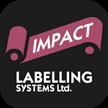
It’s the unfortunate fact of business life that disputes among shareholders are common. Think Steve Jobs at Apple. When people launch a start-up company, everyone is focused on getting the business up and trading, underlying quarrels between shareholders can be masked as you all knuckle down to keep the company growing.
However, when the honeymoon period is over and if business slows or a major decision is on the horizon, differences between the shareholders’ approach to the business can come to the fore, sometimes with damaging consequences. People often do not consider the implications of a business relationship going wrong.
Issues arise where one shareholder wants to leave to take up a new job, where a shareholder dies or where a shareholder wishes to take the company in a different direction. If a shareholders agreement is place at the outset, everyone has clarity on their position if a dispute arises or a shareholder wants to exit without enduring a costly and exhausting dispute relating to who can purchase shares and what they are worth.
Stephen Keogh, Commercial Partner of Sellors LLP Solicitors, explores why having a shareholders' agreement is a vital document in your business, what a shareholders' agreement should contain and the process for putting one in place.
A shareholders’ agreement is a private contract made between the shareholders of a company and often the company itself, which governs how the company is run, protects shareholder investments, and establishes the parameters of the relationship between the shareholders. The agreement can be entered into by individuals or corporate bodies.
The Constitution is an obligatory document under the Companies Act 2014 which is publicly available and sets out the rules under which a company is governed. The Shareholders Agreement is not compulsory, however it is a private document and for that reason it can contain more detailed information on the company and its members.
It important to understand the difference between the powers of shareholders and directors when it comes to running a company. Being a shareholder doesn’t automatically give someone the right to make day-to-day decisions or to receive information, decisions are taken by the board of directors and access to information can be limited. Very often this isn’t an issue, since the shareholders and directors are the same people.
However, as most companies grow beyond the founders, challenges around decision making present themselves regularly. A shareholders’ agreement is, in effect, all about control and protection.
1. Protection of investment
Shareholders agreements are designed to include terms to protect a shareholders financial investment in a company, regulating where money can be spent and under what conditions. It sets out what entitlement shareholders have to appoint directors to the board to ensure there is oversight on decision making and entitlement to information.
A shareholders agreement details who is responsible for the day to day running of the company which gives stability to the bank, creditors and potential purchasers.
Very often individual shareholders of a company hold valuable rights which are used by the company (e.g. rights to source code or other IP, domain names, trademarks or property) in their personal name. This can have devastating consequences for a company if relations break down and a shareholdere claims ownership of such rights personally. It is important to provide in a shareholders’ agreement that all such rights belong to and are to be transferred to the company or are held for the benefit of the company.
The Companies Act 2014 provides for limited rights for minority shareholders, it is very common in a shareholders’ agreement to provide for certain restrictions on the powers of the directors to act without the consent of specified shareholders. Matters that would commonly be so restricted include the distribution of profits, a material change in business, paying excessive employee salaries, significant borrowing or large spending.
Provisions can be made for share valuations in the event that a shareholder wishes to exit the business, this clarity is important as it tends to be a disruptive time. It is also important to cover situations such as disability and death so that new members are not imposed on existing shareholders in those circumstances. Certain provisions can oblige a shareholder to sell their shares to the existing shareholders at a discount. Certainty in this respect reduces the potential for conflict. It can also provide for situations where a majority shareholder wants to sell out and can protect a minority shareholder so that they are offered the same sale terms.
While it is important that the shareholders’ agreement protects the shareholder who wishes to exit by ensuring they receive a fair value for their shares, it is also important that it protects the remaining shareholders by ensuring that any payment to the exiting shareholder does not negatively impact on the cash flow of the business in a case where the company buys back the shares. It is recommended that a clause is included to allow for the buyback of the shares by the company to be funded over a period of time.
The death or incapacity of certain members of the management team may have a detrimental effect on a company’s prospects. It is very common for companies to take out keyman insurance on its more important management team members the proceeds of which would be used by the company to hire replacement personnel.

A shareholders’ agreement will usually contain provisions requiring directors and shareholders keep confidential all matters relating to company business. In addition, it may contain provisions preventing shareholders starting competing businesses or dealing with customers of the company if they leave the company.
A shareholder’s agreement should outline the precise procedure that the shareholders must follow should a dispute occur. A well drafted shareholders’ agreement will include provisions that pre-empt disagreements and set out how these should be resolved. This will save a great deal of time, protect the operation of the business and reduce frustration and typically assist to lead to resolution between the shareholders. This is particularly important in family-owned businesses as the next generation becomes involved in the business.
A shareholders agreement should deal with the potential introduction of new shareholders and what happens to ownership percentages. If you are a new shareholder, the agreement should protect your investment in the Company.
Shareholders can create a shareholders’ agreement at any time. The best way to prepare a shareholders’ agreement is to ask a solicitor experienced in commercial law to draft this for you, as they will ask specific questions designed to help you work through different options, depending on your circumstances. Usually, all that is needed is one or two meetings with a commercial lawyer to discuss what is needed. The shareholders agreement can then be drafted for consideration, with adjustments thereafter before they are ready to be signed.
Amesto Global 061 574250 www.amesto.global
BDO 061 414455 www.bdo.ie
McKeogh Gallagher Ryan 061 208050 www.mgraccountants.ie
Hourigan Rowsome Ltd. 061 401111 www.houriganrowsome.ie
Keogh Ryan Tierney 061 318500 www.keoghryantierney.ie
Mazars 061 319955 www.mazars.ie
Moore 061 229666 www.mspatrickmcnamara.ie
Fitzpatrick Donnellan Limited 061 310277 www.fitzpatrickdonnellan.ie
Tax Assist Accountants Limerick 061 513320 www.taxassist.ie/limerickcity
OfficeHelper Ltd. 061 336400 www.officehelper.ie
FDC Accountants Tax Consultants (Western Region) Ltd. 069 62688 www.fdc.ie
TaxAssist Accountants
Adare & Newcastle West 061 310429 www.taxassist.ie/adare
ADVERTISING / MARKETING
Bridge PR Public Relations 061 375808 www.bridgepr.ie
Southern Marketing Design Media 061 310286 www.southern.ie
Piquant Media 087 7809332 www.piquant.ie
AGRIBUSINESS
Grassland Agro 061 301788 www.grassland.ie
Samco Agricultural Manufacturing 061 396176 www.samco.ie
Veon Ltd. 3.54E+11 www.veon.ie
ARCHITECTS / PLANNING CONSULTANTS
EML Architects Ltd 061 312249 www.eml.ie
Healy & Partners Architects Ltd. 061 410966 www.healypartners.com
Praxis Architecture 061 314848 www.praxis-architecture.com
Quinn Architects 061 312100 www.quinnarchitects.ie
Lime Tree Theatre 061 953400 www.limetreetheatre.ie
Live95
061 461900 www.live95.ie
Lough Gur Development Co-operative Society Ltd. 061 385186 www.loughgur.com
The Hunt Museum 061 312833 www.huntmuseum.com
University Concert Hall 061 213311 www.uch.ie
William Bird Sales Ltd 061 419988 www.funderland.com
Irish Chamber Orchestra 061 202620 www.irishchamberorchestra.com
Dance Limerick 061 400994 www.dancelimerick.ie
Made For Stage Limited T/A MFS Group 087 1692410 www.mfs-group.ie
Murt Whelan Sound Ltd. 086 8541204 www.mws.ie
ASSOCIATION
Limerick Market Trustees 061 214782 www.milkmarketlimerick.ie
Irish Management Institute 01 2078426 www.imi.ie
Bobby Byrnes 061 316949 www.bobbybyrnes.ie
Cornstore Group 061 317799 www.cornstore.com
Flannery’s Bar 061 436677 www.flannerysbar.ie
P Flannery Bar (Flannery Ltd.) 061 415027 www.flannerys.ie
The Hunt Café / Dolmen Catering 061 312662 www.huntmuseum.com
Tuscany Bistro 085 2350210 www.tuscany.ie
Mother Macs 061 414900 www.mothermacs.ie
Market Ally Bars Ltd
T/A The Old Quarter 086 8818166 www.theoldquarter.ie
Sodalicious 061 595156 www.sodalicious.ie
Doh Proper Pizza 061 609719 www.dohpizzas.ie
Arthurs Quay Management Services 061 412462 www.arthursquay.ie
Data Storage & Management Ltd. 061 332206 www.dsm.ie
Exertis Supply Chain Services 061 226600 www.exertissupplychain.com
Go Fresh Cleaning Ltd
T/A GF Cleaners 087 2297341 www.gfcleaners.ie
Gray Offices 091 511400
Ingenium 061 385841 www.ingeniumtc.com
Parkway Shopping Centre 061 416144 www.parkwaysc.com
Cleaning Plus 061 748711 www.cleaningplus.ie
Careline Moving and Storage 061 326070 www.careline.ie
Illuminati Enterprises 083 1185050 www.isc-cx.com
CATERING / EVENTS
Brook Food Services 021 4856403 www.brookfoodservices.ie
Carambola Ltd. 061 500200 www.carambola.ie
Cater Care Ltd. 061 469008 www.catercare.ie
Masterchefs Hospitality 061 411522 www.masterchefs.ie
CONSTRUCTION SERVICES
Collen Construction Ltd. 01 8745411 www.collenconstruction.ie
Conack Construction 061 310002 www.conack.ie
Kirby Group Engineering 061 226060 www.kirbygroup.com
Michael Long Construction Ltd. T/A MLC Builders 061 512117 www.mlcbuilders.ie
Paddy Hoare Building & Civil Engineering Contractors 061 334130
The Galtee Group 062 46898 www.thegalteegroup.ie
McHale Plant Sales Limited 061 379112 www.mchaleplantsales.com
LRK Flooring Ltd. 061 215961 www.lrkflooring.ie
Gracon Equipment Inspection & Safety 087 795 6234 www.gracon.ie
Platt Reilly 4.48E+11 www.plattreilly.co.uk
Shannon Coiled Springs 061 311666 www.shannoncoiledsprings.ie
Antaris Consulting 061 953100 www.antarisconsulting.com
ExperiQ 061 957290 www.experiq.ie
Integrum Ltd. 087 9120109 www.integrum.ie
KMACS Consultancy Ltd Resonation 086 2510154 www.resonation.ie
O’Loughlin Project Engineers Ltd 061 310673 www.olpe.ie
Sales Dynamics 01 8220523 www.insthinktive.com
SolasVR 086 6235551 www.solasvr.com
Shamrock Consulting 061 633633 www.shamrockconsulting.com
The Pudding 01 5397939 www.thepuddingbrand.com
Gas Networks Ireland 021 4534000 www.gasnetworks.ie
Greensource Ltd. 061 953600 www.greensource.ie
ResourceKraft 01 9052999 www.resourcekraft.com
Simply Blue Group www,simplybluegroup.com
VIOTAS 061 970015 www.viotas.com
Arup Consulting Engineers 061 212100 www.arup.com
Atlantic Projects Company 01 2301843 www.atlanticprojects.com
Malachy Walsh & Partners 061 480164 www.mwp.ie
PUNCH Consulting Engineers 061 221200 www.punchconsulting.com
BCM Group 061 518417 www.bcmgroup.ie
Foynes Engineering Ltd. 069 65509
Takumi Precision Engineering 061 308626 www.takumiprecision.com
AQS Environmental Solutions 086 3886448 www.aqssolutions.ie
ECOS Environmental Consultants Limited 061 633644 www.ecos.ie
Rentokil 061 412588 www.rentokil.ie
ESTATE AGENT / PROPERTY SERVICES
Cushman & Wakefield 061 418111 www.cushmanandwakefield.ie
GVM Auctioneering 061 413522 www.gvm.ie
Executive Relocations 061 310099 www.executiverelocations.ie
Rooney Auctioneers (Limerick) Ltd. 061 413511 www.rooneys.eu
Regus
086 7969520 www.regus.ie
Our Home Hosts 086 4025916 www.ourhomehosts.com
Property Management Ireland (PMI) 061 451522 www.propertymanagementireland.ie
Majulah ICAV +65 6435 0277 www.finegrainproperty.com
FINANCIAL SERVICES
AIB Bank 061 414388 www.aib.ie Bank of Ireland 076 6241632 www.bankofireland.com
C&M Financial Services 061 311266 www.premiumclaims.ie
Limerick & District Credit Union Ltd. 061 455831 www.mylimerickcu.ie
Cantor Fitzgerald Ireland 061 436500 www.cantorfitzgerald.ie
Deloitte 061 435500 www.deloitte.ie
EY 061 319988 www.ey.com/en_ie
First Choice Financial Services DAC t/a Mortgage ABC 061 317260 www.fcfs.ie
Focus Capital Partners 061 214400 www.focuscapitalpartners.ie
Goodbody Stockbrokers 021 4279266 www.goodbody.ie
Glass Lewis Europe Ltd. 061 292801 www.glasslewis.com
Grant Thornton 061 312744 www.grantthornton.ie
Metis Ireland Financial Planning Ltd. 061 518365 www.metisireland.ie
Northern Trust (Ireland) Ltd. 15422696 www.northerntrust.com
PricewaterhouseCoopers 061 212300 www.pwc.ie
Sarsfield Credit Union Ltd. 061 317910 www.sarsfieldcu.ie
Ulster Bank 061 410200 www.ulsterbank.ie
IQEQ 061 714007 www.iqeq.com
FundRock Management Company S.A. (Ireland Branch) 061 502363 www.fundrock.com
Eden Capital 061 546060 www.edencapital.ie
First Citizen Finance DAC 087 2580851 / 01 8846700 www.firstcitizen.ie
PPS Financial Planning 061 484425 www.ppsfinancial.ie
EBS William Street - Emer O’Reilly Financial Services Ltd. 061 418674 www.ebs.ie
FUNERAL DIRECTORS / MEMORIALS
Griffin’s Funeral Home 061 415000 www.griffinfunerals.com
IDA Ireland
01 6034000 www.ida.ie
Limerick City & County Council 061 557202 www.limerickcity.ie
Limerick Twenty Thirty DAC 061 517432 www.limerick2030.ie
Local Enterprise Office 061 557499 www.localenterprise.ie/limerick
HEALTHCARE SERVICES
Bons Secours 061 490530 www.bonsecours.ie/limerick
Employment Health Advisors 061 303975 www.ehalimerick.ie
Medcode Health Care Services 061 596355 www.medcode.ie
Home Instead Senior Care 061 462070 www.homeinstead.ie
Irish Blood Transfusion Service 061 306980 www.giveblood.ie
Limerick Clinic 091 785590 www.limerickclinic.com
Medmark Occupational Healthcare 061 444888 www.medmark.ie
Mid West Physiotherapy 061 201444 www.midwestphysio.ie
Milford Care Centre 061 485860 www.milfordcarecentre.ie
Green Cross Pharmacy 087 9813142 www.greencrosspharmacy.ie
Fergusons Hearing Aid Clinic 061 313633 www.ferghac.ie
Health and Wellness International 1800 844300 www.healthandwellnessinternational.com
3Dental Limerick 061 414673 www.3dental.ie/limerick/
Legato Health Technologies Ireland Ltd. 087 2836499 www.legato.com
University Hospital Limerick UL Hospitals Group 061 482598 www.ulh.ie
HOTELS / CONFERENCING / CATERING SERVICES
Absolute Hotel Limerick 061 463600 www.absolutehotel.com
Adare Manor 061 605200 www.adaremanor.com
Castletroy Park Hotel 061 335566 www.castletroypark.ie
Clayton Hotel Limerick 061 444100 www.claytonhotellimerick.com
Dromoland Castle 061 368144 www.dromoland.ie
Fitzgeralds Woodlands House Hotel & Spa 061 605100 www.woodlands-hotel.ie
Great National South Court Hotel & Off The Bone Gastropub 061 487487 www.southcourthotel.com
Limerick Strand Hotel 061 421800 www.strandhotellimerick.ie
Plassey Campus Centre UL 061 202360 www.campuslife.ul.ie
The George Boutique Hotel 061 460400 www.georgelimerick.com
The Maldron Hotel Limerick 061 436100 www.maldronhotellimerick.com
The Savoy Hotel 085 1656579 www.savoylimerick.com
University of Limerick Conference and Sports Campus 061 234178 www.conference.ul.ie
The Bedford Townhouse & Cafe 061 204400 www.thebedford.ie
Trigon Hotels 021 4947555 www.trigonhotels.com
INDIVIDUAL
Maeve Galvin 085 2559078
Masterpiece Property Ltd. 061 518388 www.masterpieceproperty.ie
The Otto Clinic 061 317678 www.theottoclinic.ie
Decare Dental Insurance Ireland 094 9378608 www.decare.ie
FBD Insurance 061 491400 www.fbd.ie
Frost Insurances Ltd. 061 310566 www.frostinsurances.ie
LAYA Healthcare 021 2022807 www.layahealthcare.ie
Marsh Ireland Ltd. 021 4907400
Power Insurances 061 226722 www.powerinsurances.ie
Sullivan Insurances
061 313255 www.sullivaninsurances.ie
VHI Healthcare www.vhi.ie
Willis Towers Watson 061 218900 www.wtwco.com/en-ie
ActionPoint 061 337632 www.actionpoint.ie
Aspira 021 2352550 www.aspira.ie
Dynamic Presentation Systems 061 303468 www.dpsav.ie
FileCloud Technologies Ltd. www.filecloud.com 086 3242890
First Compliance - the data protection experts 087 7787606 www.first-compliance.com
Hybrid Technology Partners 061 211444 www.hybridtp.ie
IT Systems 061 375140 www.itsystems.ie
NTES Ltd. 061 386600 www.ntesitsupport.ie
Numata Business IT 061 548017 www.numata.ie
LEGAL SERVICES
Dundon Callanan Solicitors 061 411022 www.dundoncallanan.ie
Hayes Solicitors Limerick 061 469504 hayes-solicitors-limerick-lawyer. business.site
Holmes O’Malley Sexton
061 313222 www.homs.ie
Keating Connolly Sellors 061 414355 www.sellors.ie
Leahy & Partners 061 315700 www.leahyandpartners.com
Melvyn Hanley Solicitors 061 400533 www.melvinhanly.com
O’Gorman Solicitors 061 418214 www.ogorman.ie
Sweeney McGann Solicitors 061 317533 www.sweenymgcann.com
Clohessy Minihane Solicitors LLP 061 461000 www.cmlegal.ie
BTiS 061 233625 www.btis.ie MANUFACTURING & PRODUCTION
Adhesives Research Ireland Ltd. 061 300300 www.adhesivesresearch.com
Analog Devices International UC 061 229011 www.analog.com
Chemifloc Ltd. 061 708699 www.chemifloc.com
Copytype (Ire) Ltd. 061 358933 www.copytype.ie
Dell Technologies 061 304091 www.dell.ie
DesignPro Automation 069 63842 www.designproautomation.com
Electrical Rewind Services 061 417070 www.electricalrewinds.ie
GE Sensing EMEA 061 470200 www.ge.com
HL Commodity Foods Ltd. 061 383801 www.hlcf.ie
Irish Cement Ltd. 061 487200 www.irishcement.ie
JJ O’Toole Ltd. 061 229333 ww.jjotoole.ie
Key Ingredients 061 358977 www.keyingredients.ie
Macro Stainless Ltd. 061 414555 www.macrostainless.com
Maidenform Brands International Ltd. 061 474435 www.maidenform.com
Novostrat Ltd. 061 339287 www.novostrat.com
ON Semiconductor 061 583000 www.onsemi.com
Optel Group 061 480965 www.optelgroup.com
Provincial Floorcoverings Ltd. 061 227100 www.pfl.ie
Qualpack Ltd. 087 1702517 www.qualpack.net
VPK Packaging Limited 061 402500 www.rigid.ie
RUSAL Aughinish 061 604301 www.rusal.ru/en/
SL Controls Limited
071 9134040 www.slcontrols.com
Spectrum Instruments www.ntmdt-fi.com 061 333322
Teckro Limited 061 529001 www.teckro.com
Wuerth Ireland Ltd. 061 430200 www.wurth.ie
Global Sauces 061 306700 www.globalsauces.ie
Croom Medical 061 397744 www.croomprecision.com
MEDIA / NEWSPAPERS / PUBLISHING
Limerick Leader 061 214501 www.limerickleader.ie
Limerick Post 061 413322 www.limerickpost.ie
Audi Limerick 061 336000 www.audilimerick.ie
Brian Geary Toyota 061 225225 www.briangeary.ie
Dennehy Motors Ltd. 061 442444 www.denehymotors.ie
Lyons of Limerick 061 413344 www.lyonsoflimerick.com
OFFICE SUPPLIES / FURNITURE
Condell The Office Centre 061 414806 www.theofficecentre.com
M2 Office Supplies 061 303666 www.m2.ie
PHARMACEUTICAL / CHEMICAL / MEDICAL
Cook Ireland Ltd. 061 334440 www.cookmedical.com
Fleming Medical Ltd. 061 304600 www.flemmingmedical.ie
Johnson & Johnson Vision Care 061 203203 www.janssen.com
New Vistas Healthcare Ltd. 061 334455 www.newvistashealthcare.com
PBC Biomed 061 704740 www.pbcbiomed.ie
Regeneron Ireland Ltd. 061 782000 www.regeneron.com
Stryker Howmedica International 061 498200 www.stryker.com
TECHNOPATH Distribution Ltd. 061 335844 www.techno-path.com
Teleflex 061 331906 www.teleflex.com
BD Research Centre Ireland 061 538619 https://emea.jobs.bd.com/limerickireland
Serosep Limited 061 358190 www.serosep.com
Edwards Lifesciences 087 2304032 www.edwards.com
Morning Star Photography 061 450709 www.morningstar.ie
Alphaset 061 314227 www.alphaset.ie
Cantec Group 061 313646 www.CantecGroup.ie
Cube Printing Ltd. 061 400658 www.cube.irish
Detail Factory 087 6858758 www.detailfactory.ie
Troy Marketing 061 338284 www.troymarketing.ie
GBM Limerick Ltd. 061 317977 www.gbmlimerick.ie
Impact Labelling Systems Ltd. 061 437990 www.impactlabelling.com
Edward Cotter Partnership (Limerick) Ltd. 061 313340 www.ecp.ie
Linesight 061 493515 www.linesight.com
CuddyQS 061 574177 www.cuddyqs.ie
RECRUITMENT / PERSONNEL SERVICES
Careerwise Recruitment 061 364990 www.careerwise.ie
CPL 061 221701 www.cpl.ie
Harmonics 061 336136 www.harmonics.ie
Melior Management 061 311700 www.melior.ie
Morgan McKinley 061 430940 www.morganmckinley.ie
QPTech IT Recruitment
061 209510 www.qptech.ie
Turas Nua Limerick 061 314594 www.turasnua.ie
CREGG Recruitment 061 363318 www.creggrecruitment.ie
RETAIL / SHOPPING
Ashbrook Pharmacy Ltd. t/a Scanlons Pharmacy 061 454000 www.scanlonspharmacy.com
Gleeson Spar Supermarket 061 310913
Keanes Jewellers 021 4271256 www.keanes.ie
Lock Doctor Ltd 061 305664 www.lockdoctor.ie/locksmiths-inlimerick/
Matthew Stephens Jewellers Ltd. 061 415583 www.matthewstephens.ie
Ms Elenora Hogan 061 415195
O’Briens Wine Off Licence 061 422559 www.obrienswine.ie
O’Mahonys Booksellers Ltd. 061 418155 www.omahonys.ie
Ryans Centra 061 313396 www.centra.ie
Tadhg Kearney Jewellers 061 413034
Tony Connolly Menswear 061 410324 www.connollyman.com
Widdess Fitzgibbon Pharmacy 061 414061 www.widdessfitzgibbonpharmacy.ie
Lidl Ireland GmbH 087 9165882 www.lidl.ie
Re:Story Limerick 083 0599 400 http://Restory.ie
Tesco Ireland 087 1332526 www.tescoireland.ie
SECURITY SERVICES
BS & B Safety Systems 061 227022 www.bsb.ie
GGL Security 061 319077 www.gglsecurity.com
Synergy Security Solutions 061 425200 www.synergy365.ie
Q3 Security Systems 061 353533 - 01 5394433 www.q3.ie
SPORTS / LEISURE
Greyhound Racing Ireland 061 448000 www.grireland.ie
Thomond Park Stadium Company Ltd. 061 421100 www.thomondpark.ie
UL Sport 061 213555 www.ulsport.ie
International Rugby Experience www.internationalrugbyexperience.com
Evolution Cycles 061 513063 www.evolutioncycles.ie
Three Ireland (Hutchinson) Limited 083 333 3333 www.three.ie
Virgin Media 061 272 174 www.virginmedia.ie
4site 061 3066688 www.4sitenetworks.com
Enet 061 274000 www.enet.ie
TOURISM / TRAVEL SERVICES
Limerick Travel 061 204444 www.limericktravel.ie www.letsgotravel.ie
Treaty City Brewery 086 4531400 www.treatycitybrewery.ie
TRAINING / EDUCATION
Further Education & Training Centre 061 442100 www.lcetb.ie
Glenstal Abbey 061 621019 www.glenstal.com
Griffith College Limerick 061 310031 www.griffith.ie/locations/limerick
The Technological University of the Shannon: Midlands Midwest 061 293233 www.TUS.ie
Limerick Training Centre 061 487900 www.learningandskills.ie
Mary Immaculate College 061 204994 www.mic.ul.ie
National Learning Network 061 229777 www.nln.ie
Bernal Enterprise Services 087 4146431 www.bernalinstitute.com
Optima Training and Consulting Ltd. 061 514744 www.optimatraining.ie
St. Gabriel’s Foundation 061 302733 www.stgabriels.ie
Confirm Centre-Smart Manufacturing
061 234395 www.confirm.ie
O’Dwyer Safety Services Ltd. 061 422207 www.ossltd.ie
Villiers School 061 451447 www.villiers-school.com
Mid West Food Safety Co. Ltd. 061 340943 www. midwestfoodsafety.ie
TRANSPORT / LOGISTICS / DISTRIBUTION SERVICES
AerCap Ireland Ltd. 061 723600 www.aercap.com
Argosea Services Ltd. 061 413833 www.argosea.ie
ComfortDelGro Irish Citylink Ltd. T/A Citylink 091 564164 www.citylink.ie
Doyle Shipping Group 061 303750 www.dsg.ie
Eastway Global Forwarding Ltd. 061 500700 www.eastway.ie
Iarnrod Eireann 061 217308 www.irishrail.ie
Irish Express Cargo Ltd T/A Flextronics 061 480777 http://http.logistics.flextronics.com
Jenkinson Logistics 061 261600 www.jenkinson.ie
Leatrans Ltd. 061 304330 www.leatrans.com
Martin Ryan Haulage 061 381231 www.martinryanhaulage.ie
Park Magic 061 311422 www.parkmagic.net
Shannon Foynes Port Company 069 73100 www.SFPC.ie
Shannon Group 061 712000 www.shannongroup.ie
STL Logistics 061 200250 www.stllogistics.ie
Corporate Coaches 087 2584811 www.corporate-coaches.ie
Bus Eireann 01 8366111 www.buseireann.ie
Fusion Logistics Ltd. 087 2583964 www.fusionlogistics.ie
Barnardos
The Saoirse Foundation 083 004 4444 www.thesaoirsefoundation.com
Cliona’s Foundation 061 331333 www.clionas.ie
Focus Ireland Ltd. 061 405300 www.focusireland.ie
Limerick Enterprise Development Partnership (LEDP) 086 839 3397 www.ledp.ie
Limerick Youth Service 061 412444 www.limerickyouthservice.com
Mid West Simon Community 061 608980 www.midwestsimon.ie
Network Ireland Limerick 085 160 1783 www.networkireland.ie
Novas 061 370325 www.novas.ie
Paul Partnership/Limerick LES 061 412999 www.paulpartnership.ie
Peter McVerry Trust 01 8230776 www.pmvtrust.ie
Rape Crisis Midwest 1800 311511 www.rapecrisis.ie
Society of St. Vincent de Paul 061 317327 www.svp.ie
Tait House Community Enterprise CLG 061 415340 www.taithouse.ie
The Hope Foundation 021 4292990
Bóthar 087 4574164 www.bothar.ie
Saint Mary’s Cathedral 061 310293 www.saintmaryscathedral.ie
Bedford Row Family Project 061 315332 www.bedfordrow.ie
Helium Arts + 353 (0) 44 93 96 960 www.helium.ie
Shannon Region Conference and Sports Bureau 087 6616630
WASTE MANAGEMENT / RECYCLING
Clean Ireland Recycling www.cleanireland.ie (189) 0361800
DGD Shredding Services 061 491333 www.dgdshredding.ie
Limerick Metal Recycling Company
061 418153 www.oranmetalgroup.com
Mr Binman 061 351127 www.mrbinman.com
Limerick Polymer Production 061 523333 www.lpp.ie
WEB, APP & SOFTWARE SERVICES
AMCS Group 061 390600 www.amcsgroup.com
Arista Networks Ltd. 061 369542 www.arista.com
Avvio 061 335680 www.avvio.com
Casa Communications Ltd. 061 633000 www.casa-systems.com
Cashbook Software 061 338400 www.cashbook.com
CloudCARDS Ltd. 061 748767 www.cloudcards.ie
DTS Licensing Limitedan XPERI Company 061 507272 www.xperi.com
Elive Ltd. 061 305038 www.elive.net
Extreme Networks 061 705500 www.extremenetworks.com
Kemp Technologies Ltd. +1 631 345 5292 www.kemptechnologies.com
Siemens Industry Software Ltd. 061 256200 www.mentor.com
WP Engine www.wpengine.com
Blocworx 061 518426 www.blocworx.com
Kneat Solutions Ltd. 061 203826 www.kneat.com
Irish Wire Products Ltd. 061 221100 www.irishwire.com
McMahons Builders Providers 061 484030 www.mcmahons.ie
Musgrave MarketPlace 061 444700 www.musgravemarketplace.ie
Pallas Foods 069 22151 www.pallasfoods.com
Richardsons Foods 061 294552 www.richardsons.ie
Transpec Truck & Trailer Parts Ltd. 061 437932 www.transpec.com
Craft Food Traders 061 383930 www.craftfoodtraders.ie
✔ Keep up to date with regional business community news through Fortnightly Chamber e- newsletter to 1,700 incompany contacts.
✔ Complimentary copies of membership magazine Limerick Chamber Connect.
✔ Supporting you with your workforce planning - avail of 20% funding for eligible training for your team via Limerick Chamber Skillnet.
✔ Join Limerick Chamber Gift Card scheme to promote your consumer facing business or reward your team.
✔ Get involved and have your views / concerns included in factors impacting on Mid West business, represented through lobbying at Local, National and European level.
✔ Boost your organisations profile through our many marketing opportunities.
✔ Avail of our exclusive Online Member’s area Business Directory, where you can post offers, Jobs and events.
✔ Grow your network by attending our many organised business events / briefings.
✔ Get exposure in our Members Magazine through a free feature in new members section & Members Directory and avail of our competitive rates in advert / editorial space.
✔ Complimentary access to CPD accredited events (avg 6 hours per annum).
✔ Free entry to the annual Regional Business Awards.
✔ Support the mission and work of Limerick Chamber to foster the best possible business environment for businesses trading in the Mid West.
✔ Find out how Limerick Chamber membership can benefit your business.
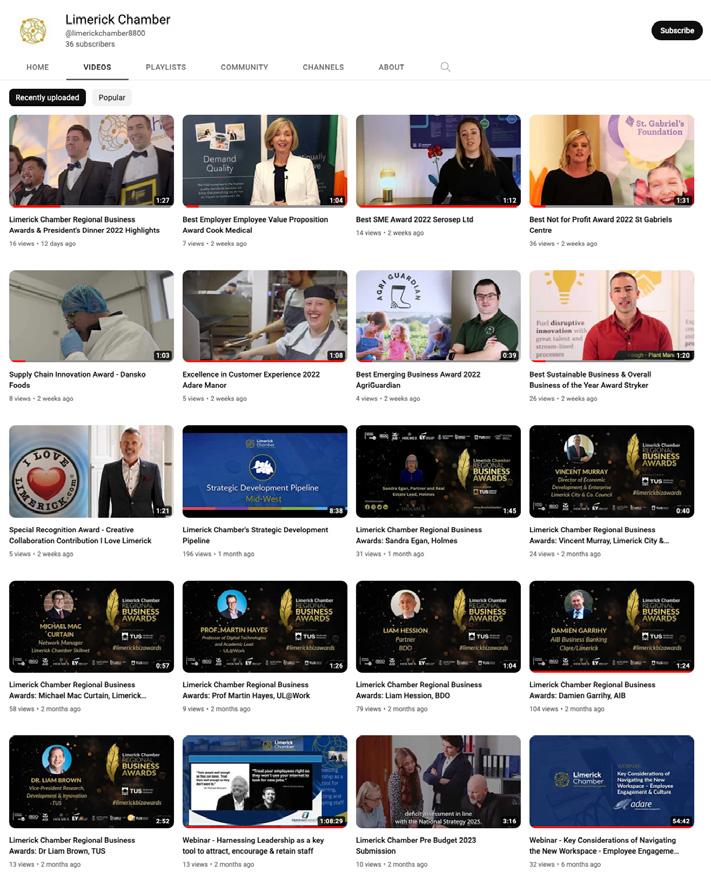






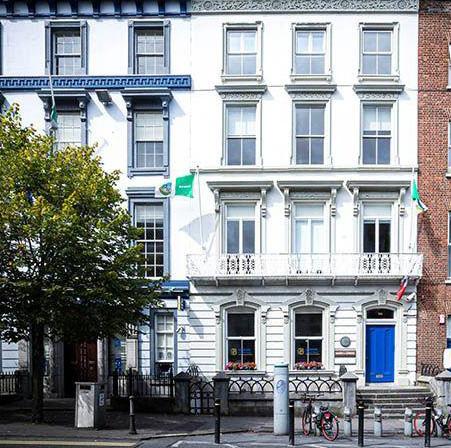
 Limerick Chamber would like to acknowledge the ongoing support provided by our Strategic Partners.
Limerick Chamber would like to acknowledge the ongoing support provided by our Strategic Partners.
Get involved and have your voice heard. Help set the policy agenda and avail of the dedicated support of Limerick Chamber, to help address the issues that are effecting your business at local , regional and national levels. TO MAKE THE MOST OF YOUR
Ensure you and your colleagues are in receipt of our bi-weekly newsletter: featuring the latest news, training, and events.
Upskill yourself and your workforce by taking advantage of the diverse range, of free and subsidised training programmes, offered by Limerick Chamber Skillnet.
Ensure you are receiving your event invitations via email (please ensure to check your junk folder)
Make sure you enter our annual Limerick Chamber Regional Business Awards
Be active with your chamber in requesting supports and events centred around a topic of your choice.
Have your say- be sure to participate in our surveys relating to various policy initiatives. CONNECTING OUR COMMUNITY 53
Take part and reach out in regard to your training and staffing needs with Limerick Chamber Skillnets. BECOME A MEMBER OF LIMERICK CHAMBER JOIN
TODAY VISIT: www.Limerickchamber.ie info@limerickchamber.ie 061 217600
Limerick
Chamber
Date: 17th January 2023 Time: 11.30am - 12.45pm Venue: Limerick Chamber
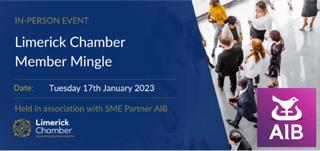

Date: 31st March 2023 Time: 12pm – 1pm Venue: Hosted virtually
Limerick


February Speaker: Karl Daly, Director, Moore Financial
Date: 7th February 2023 Time: 5.00pm - 7.00pm Venue: The Hunt Museum
Limerick 1st TuesdaysMarch Speaker: Lavinia Ryan, Corporate Business Manager, VHI

Date: 7th March 2023 Time: 5.00pm - 7.00pm Venue: The Hunt Museum
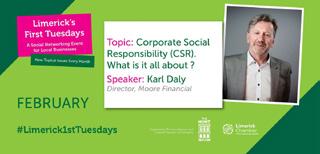
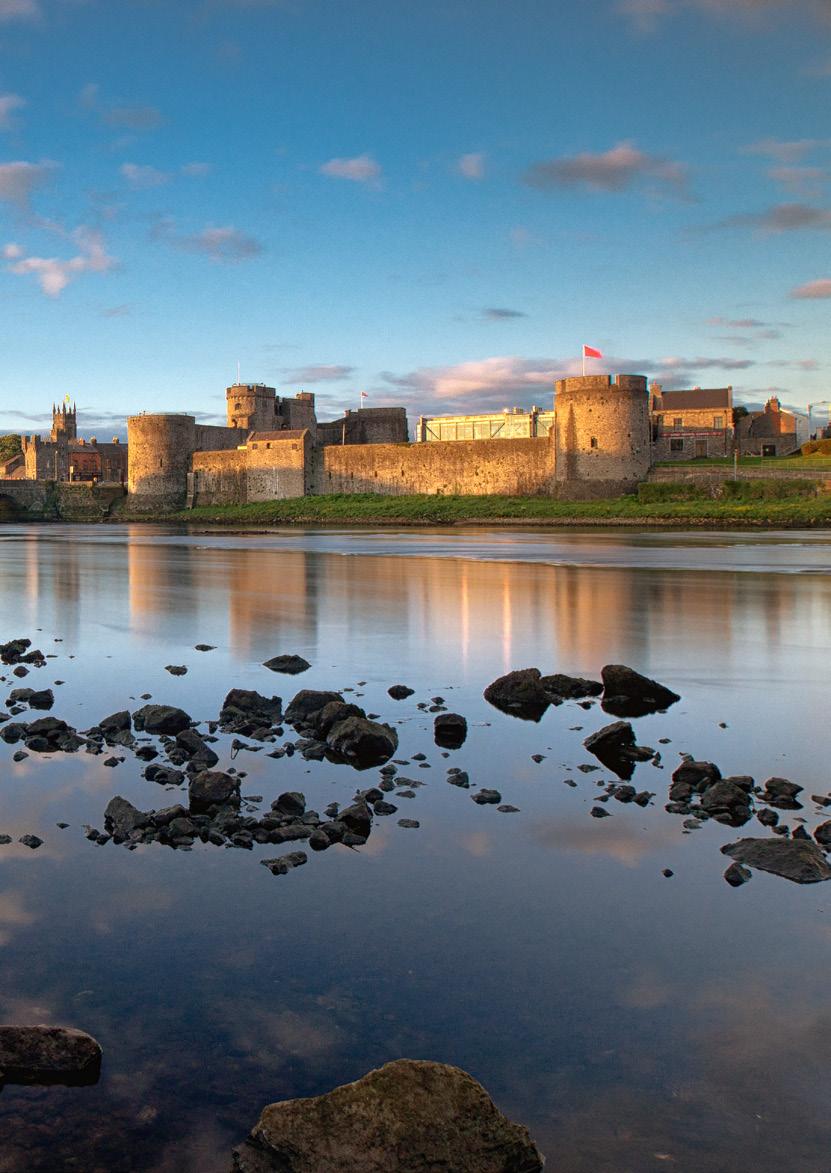











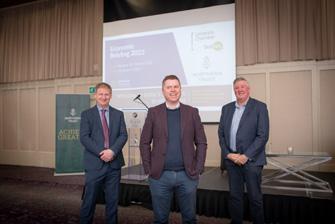

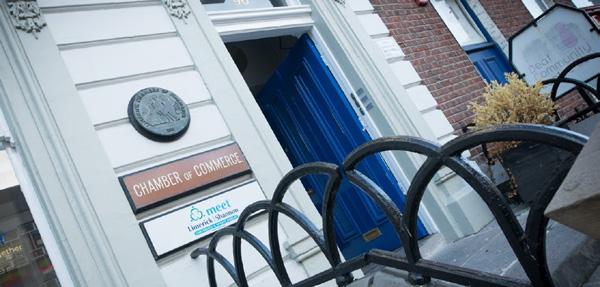


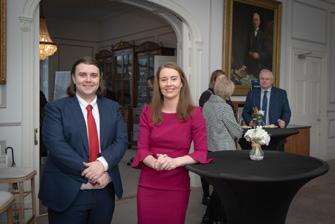
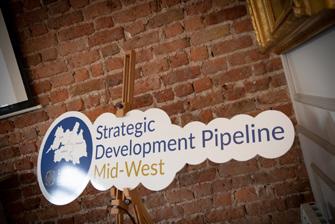

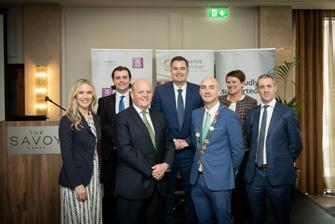



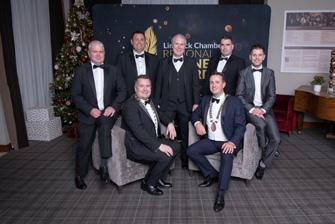

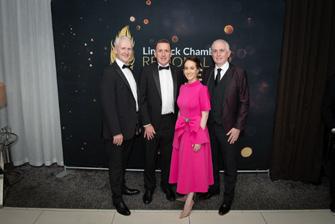

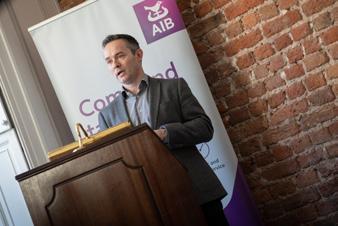

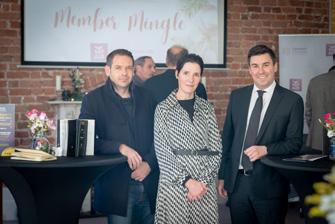
Gender Pay Gap reporting is coming. Shining a light on gender pay inequalities will revolutionise pay transparency, helping to achieve gender equity in the workplace. Discover how EY can help you today. ey.com/ie
